Virginia Documents
Quitclaim Deed
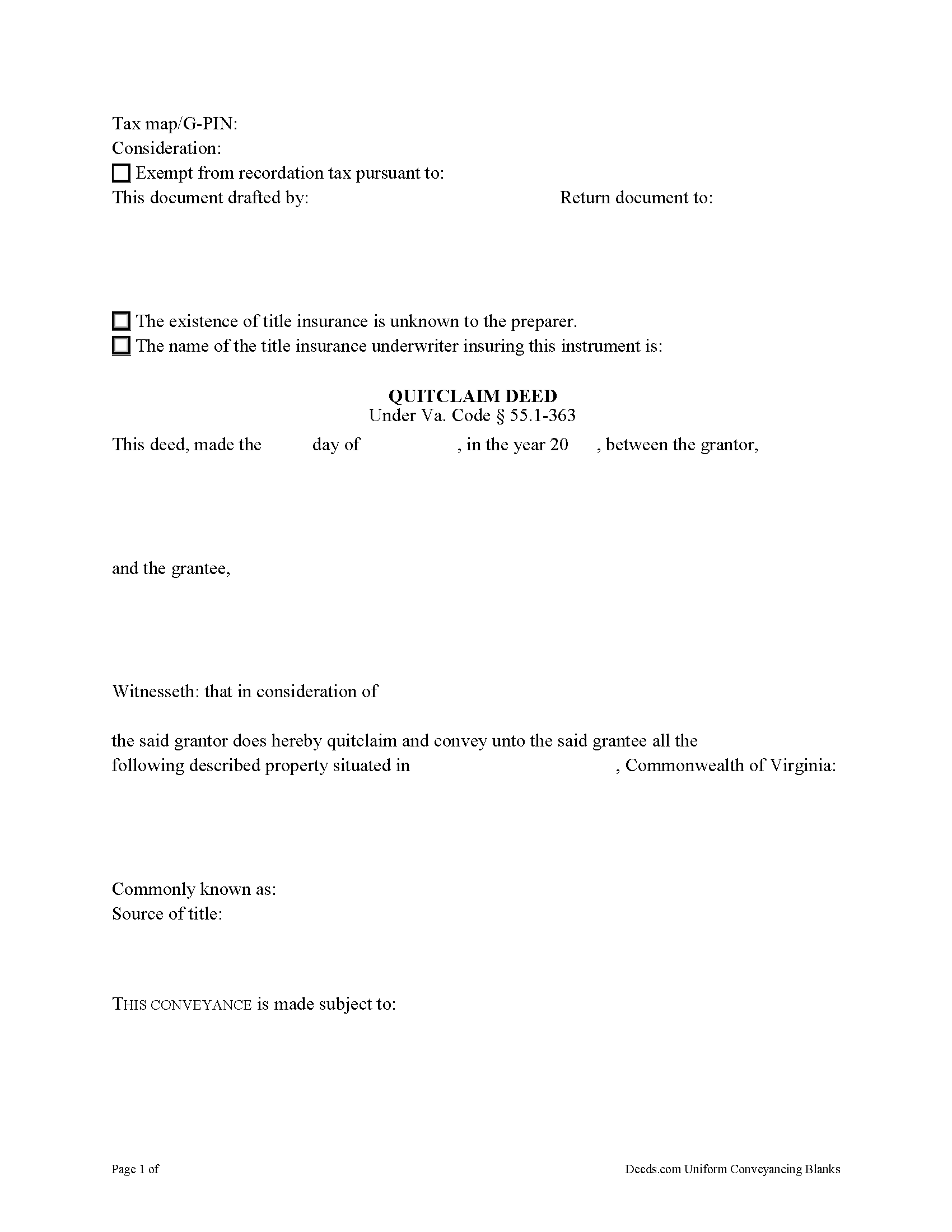
Quitclaim deeds are statutory forms for conveying real property in the Commonwealth of Virginia. When a deed includes specific words of release, the grantor relinquishes all right, title and interest and any future claim, challenge, or demand on the land (Va. Code 55.1-363).
Quitclaim deeds carry no warranty of title, and merely transfer whatever interest, if any, the grantor has in the property at the time of conveyance. For this reason, they provide the least amount of surety to the buyer/grantee and are typically reserved for situations where the two parties are familiar, such as adding or removing a name from the title, or in cases of divorce.
To transfer title, a deed requires each grantor's and grantee's name, marital status, and address, and the grantee's manner of vesting title. In addition, the deed recites the consideration the grantee is paying for the transfer of title. A state recordation tax applies unless a valid exemption is noted on the face of the deed. To properly identify the parcel changing ownership, a deed includes the full legal description of the property and notes the derivation of the grantor's title and any restrictions on the property.
Every (... More Information about the Virginia Quitclaim Deed
Gift Deed
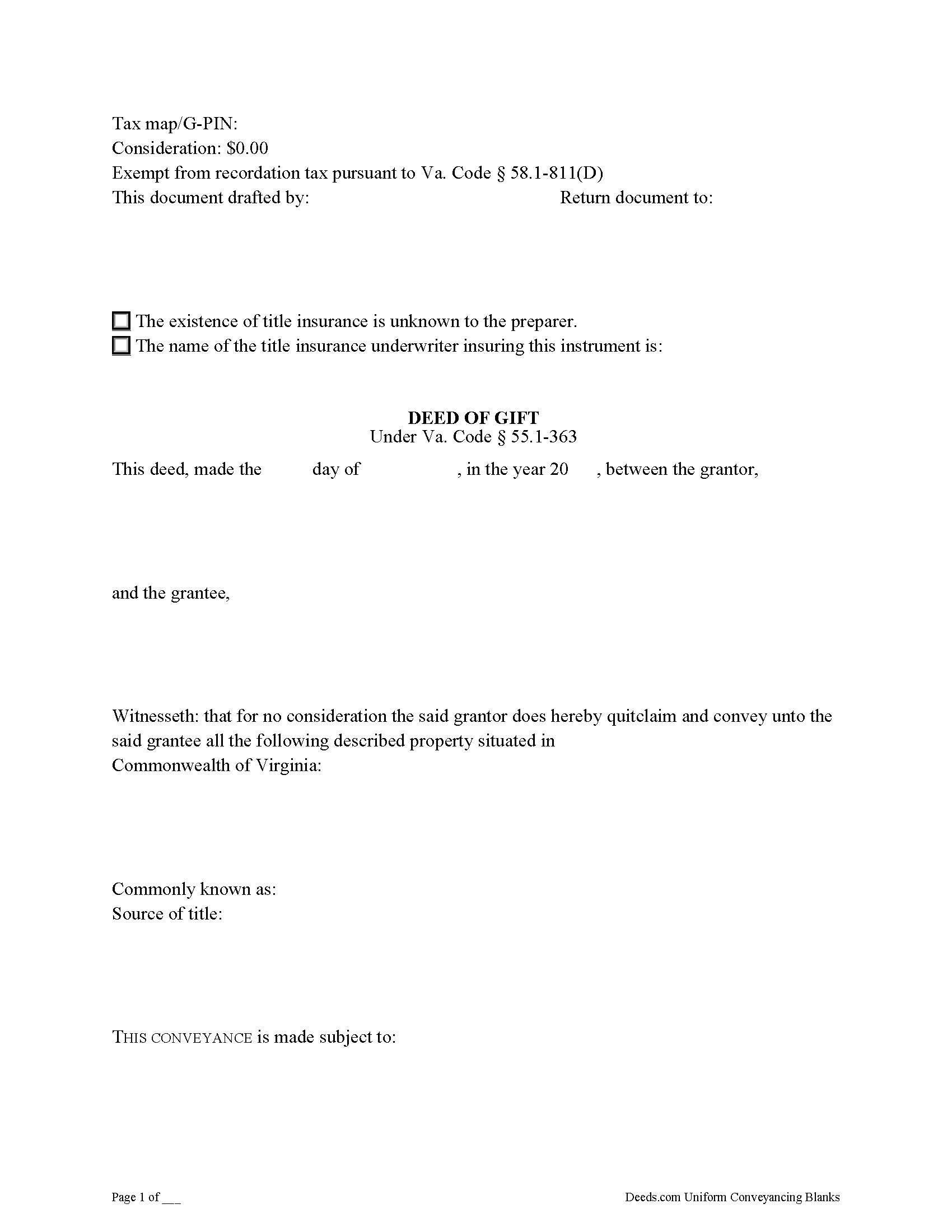
Gifts of Real Estate in Virginia
A gift deed, or deed of gift, is a legal document voluntarily transferring title to real property from one party (the grantor or donor) to another (the grantee or donee). They typically transfer real property between family or close friends. Gift deeds are also used to donate to a non-profit organization or charity.
Gift deeds, by definition, are transfers made for no consideration. To gift property to a donee, the donor may execute a quitclaim, special warranty, or warranty deed, depending on the level of protection they wish to provide. In general, though, gift deeds with full warranties are unusual; most donors choose either quitclaim or special warranty deeds.
Quitclaim deeds transfer the owner's property rights to the recipient with no assurances about the status of the title, or even a guarantee that they have actually own the property. Special warranty deeds confirm that the donor owns the property, has the right to transfer it, and will defend the donee against claims on the title that relate to their period of ownership.
For a gift deed to be valid, the grantor must intend to make a gift of the property, deliver the property t... More Information about the Virginia Gift Deed
Gift Deed Special Warranty
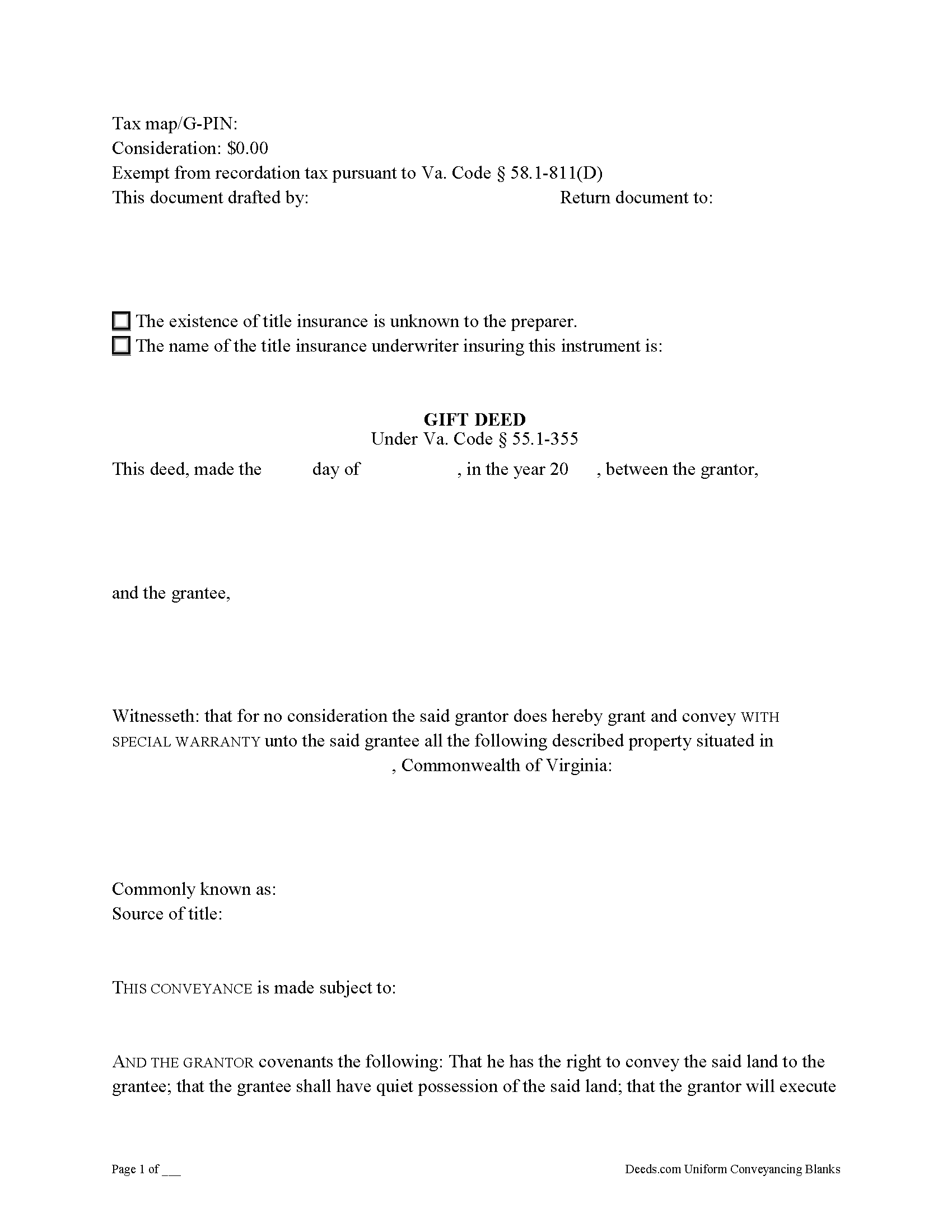
A gift deed, or deed of gift, is a legal document voluntarily transferring title to real property from one party (the grantor or donor) to another (the grantee or donee). They typically transfer real property between family or close friends. Gift deeds are also used to donate to a non-profit organization or charity.
Gift deeds, by definition, are transfers made for no consideration. To gift property to a donee, the donor may execute a quitclaim, special warranty, or warranty deed, depending on the level of protection they wish to provide. In general, though, gift deeds with full warranties are unusual; most donors choose either quitclaim or special warranty deeds.
Quitclaim deeds transfer the owner's property rights to the recipient with no assurances about the status of the title, or even a guarantee that they have actually own the property. Special warranty deeds confirm that the donor owns the property, has the right to transfer it, and will defend the donee against claims on the title that relate to their period of ownership.
For a gift deed to be valid, the grantor must intend to make a gift of the property, deliver the property to the grantee, and the grantee must ... More Information about the Virginia Gift Deed Special Warranty
Warranty Deed
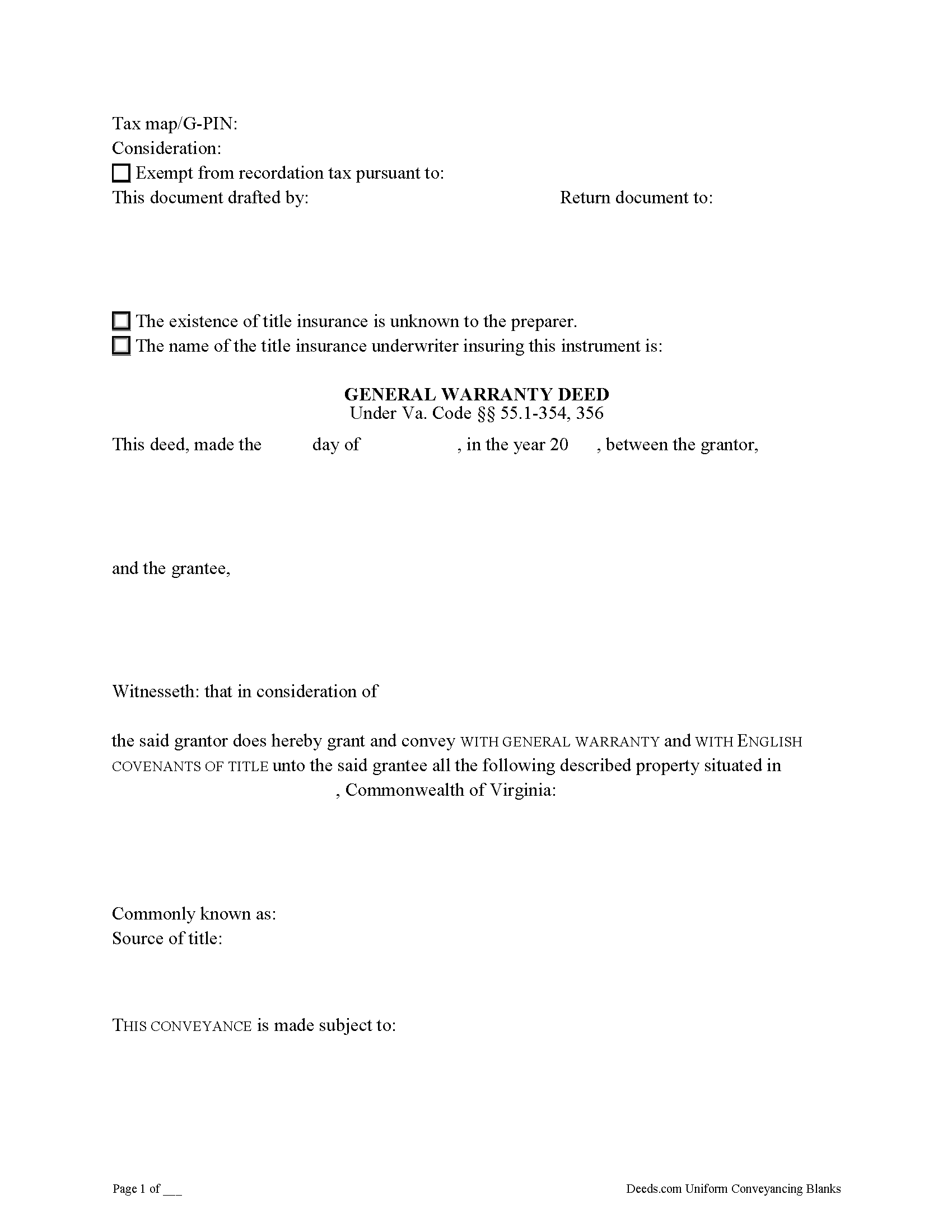
A warranty deed is commonly used to transfer title to real property in Virginia. The statutory form of a deed is presented in 55.1-300 of the Virginia Code and can be used for a warranty deed. Every deed conveying land in this state is construed to include all the estate, right, title, interest, both in law and in equity, of the grantor in or to such lands, unless a limitation is expressed in the deed (55.1-301). A deed for real property in this state will also include, unless an exception is made in the deed, all appurtenances, buildings, and privileges belonging to the land being conveyed (55.1-303). A covenant of general warranty is construed to be a covenant from the grantor that he will warrant and defend the property being conveyed to the grantee, his heirs, personal representatives, and assigns, against the claims and demands of all persons whomsoever (55.1-354). A general warranty deed customarily includes English covenants of title, which includes, according to statute, a covenant of right to convey, a covenant of quiet possession and freedom from encumbrances, a covenant of further assurances, and a covenant of no act to encumber, in addition to a covenant that t... More Information about the Virginia Warranty Deed
Special Warranty Deed
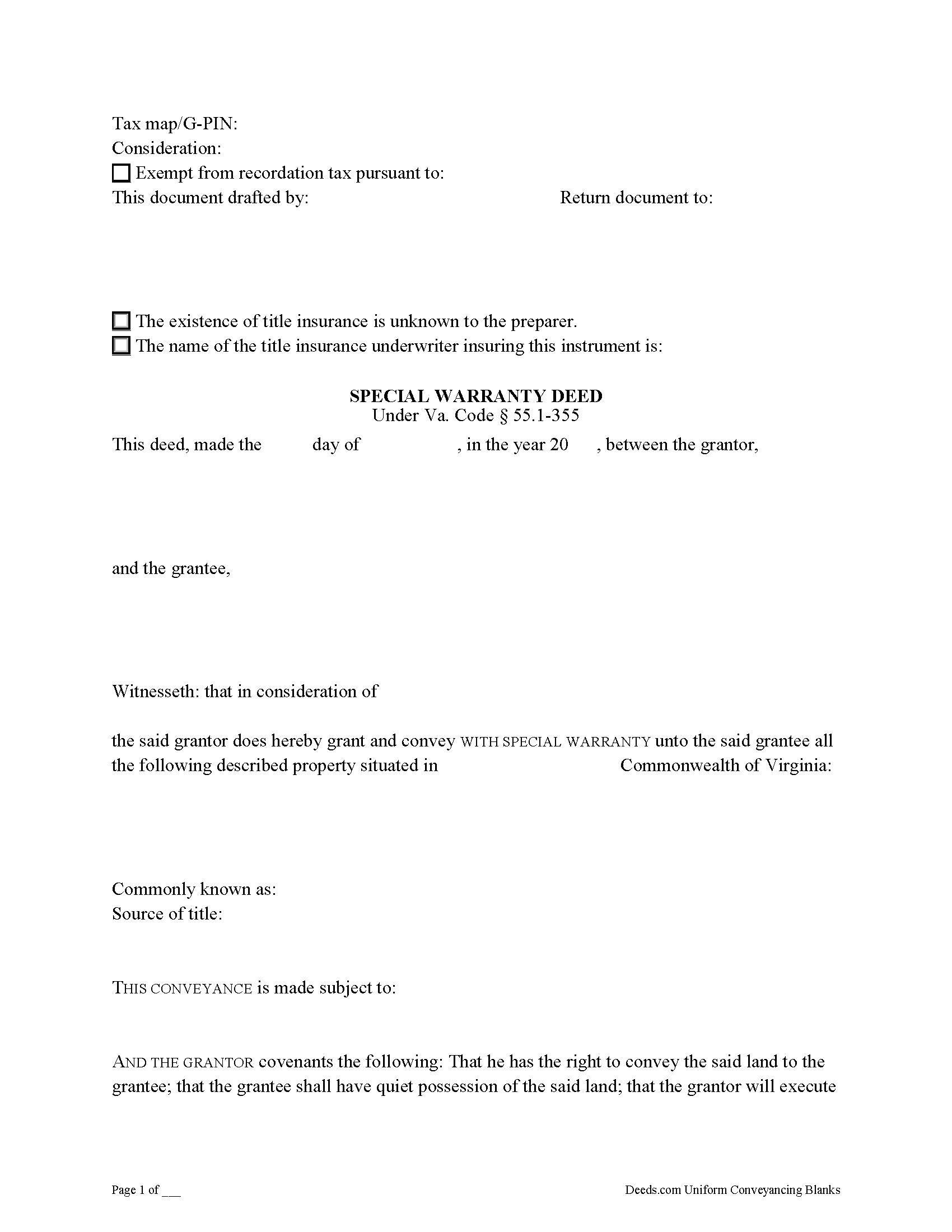
A special warranty deed is a common form of conveyance in Virginia that is used to transfer title to real estate. This type of deed is not as extensive as a warranty deed. The statutory form of a real estate deed is contained in 55.1-300 of the Virginia Code and can be used for a special warranty deed. This type of deed contains a covenant from a grantor that he will "warrant specially the property hereby conveyed" and will have the same effect as if the grantor had covenanted that he, his heirs, and personal representatives will forever warrant and defend the property unto the grantee, his heirs, personal representatives, and assigns, against the claims and demands of the grantor and all persons claiming or to claim by, through, or under him (55.1-355). Unless an exception is made in the deed, all appurtenances, buildings, and privileges belonging to the land being conveyed will be included in the conveyance (55.1-303).
In order for a special warranty deed to be submitted for record to a clerk of a circuit court in any county or city, it must contain the grantor's original signature. The grantor must acknowledge his signature or have it proved by two witnesses. Witnesses are no... More Information about the Virginia Special Warranty Deed
Grant Deed
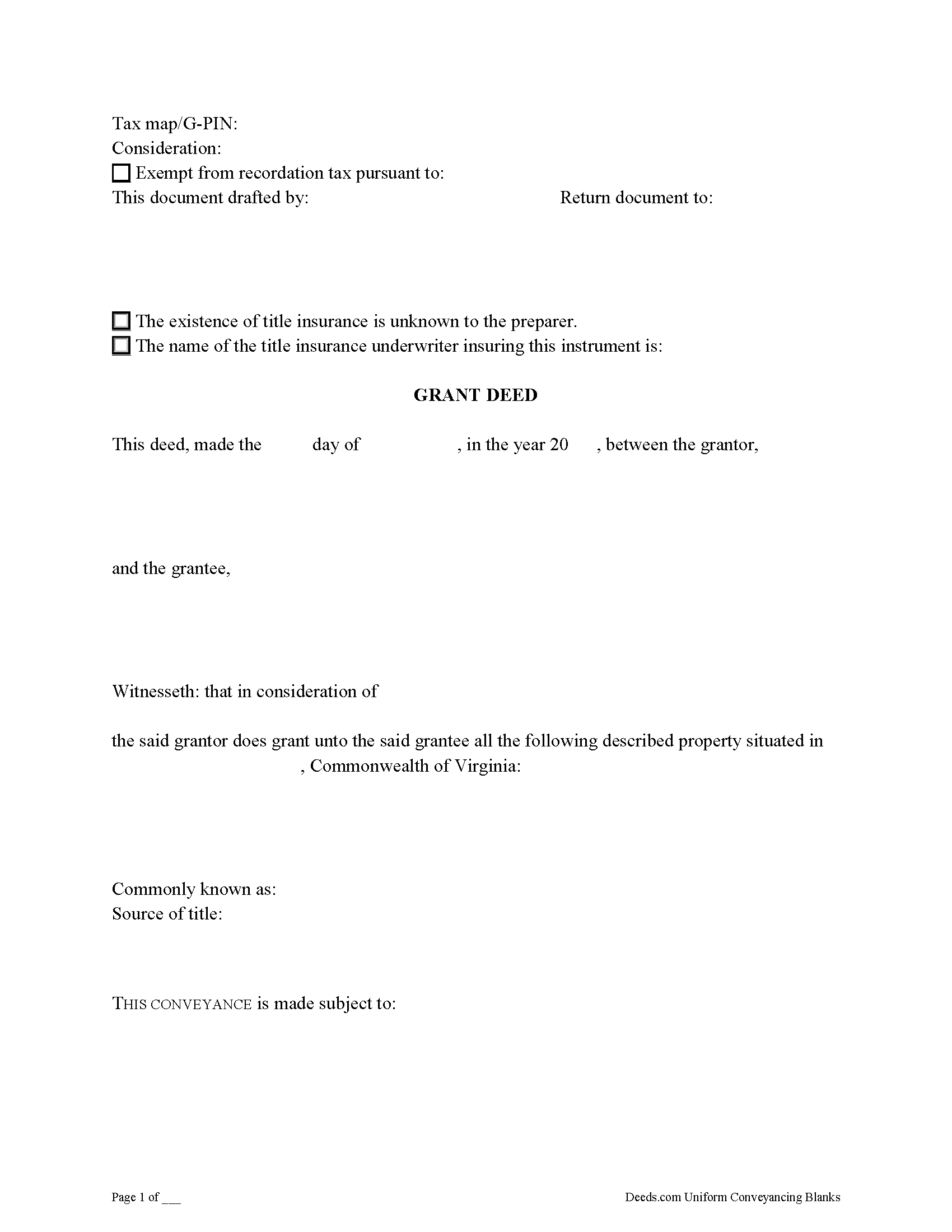
In Virginia, title to real property can be transferred from one party to another by executing a grant deed. Use a grant deed to transfer a fee simple interest with minimal covenants of title. The word "grant" typically signifies a grant deed, but it is not a statutory form in Virginia.
Grant deeds offer buyers (grantees) more protection than quitclaim deeds, but less than warranty deeds. Grant deeds guarantee through explicit covenants that the title is free of any encumbrances, and that the grantor is seized of a fee simple interest in the property. Grant deeds do not require the grantor to defend the title against claims, as in a warranty deed.
In addition to meeting all state and local standards for recorded documents, a lawful grant deed includes the grantor's full name, mailing address, and marital status; the consideration given for the transfer; and the grantee's full name, mailing address, marital status, and vesting. Virginia requires each party's name to be underlined or capitalized in the conveyancing instrument for indexing purposes (Va. Code Ann. 17.1-223). Vesting describes how the grantee holds title to the property. Generally, real property is owned in either ... More Information about the Virginia Grant Deed
Correction Deed
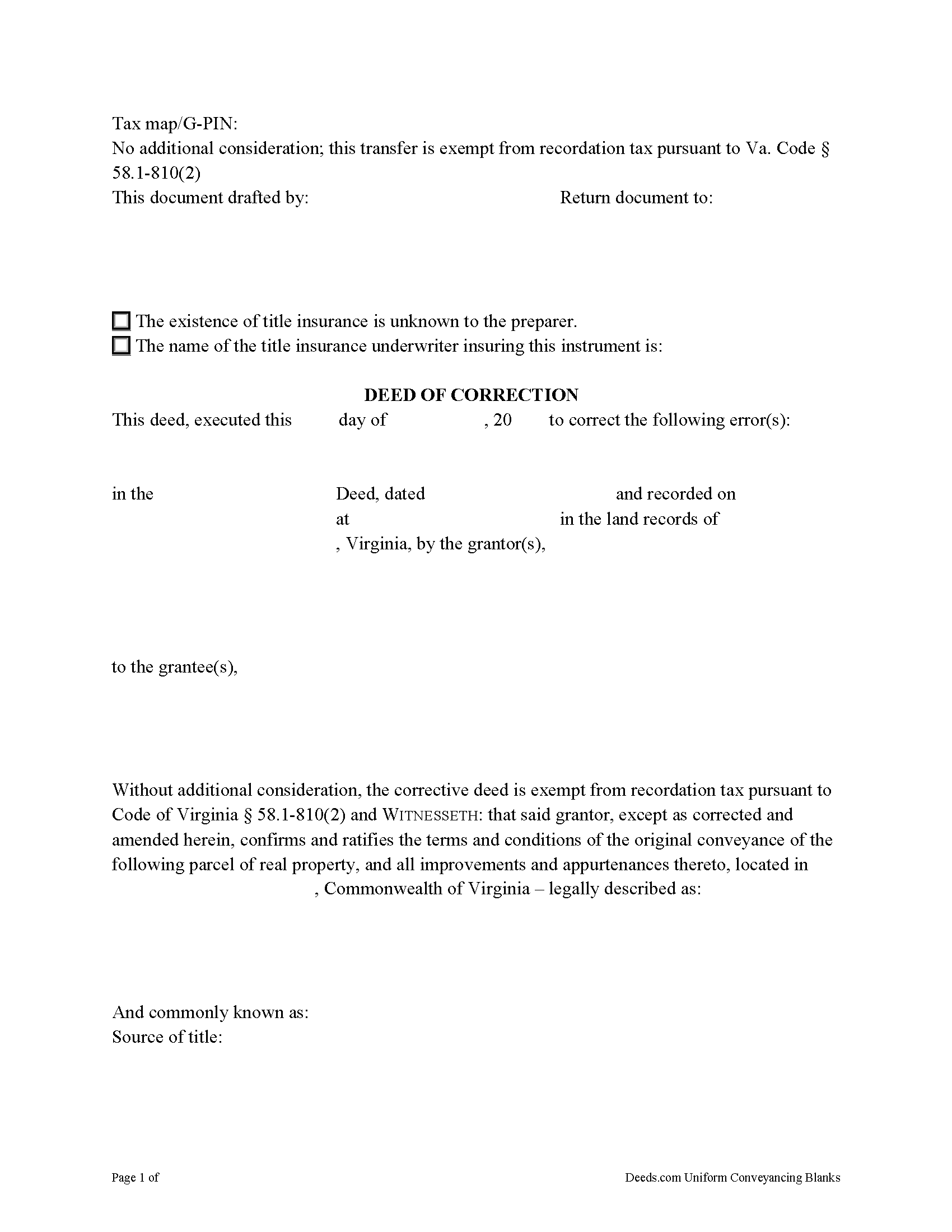
Use a deed of correction from the original grantor to amend an error in a previously recorded deed in Virginia.
Errors in a previously recorded deed in Virginia may be cured by a deed of correction from the grantor to the grantee of the original deed. The new document identifies the error by type, the prior deed by date and recording number, and inserts the correct information; otherwise it duplicates the format of the original deed. The deed requires no consideration statement and is exempt from transfer tax. State the exemption on the face of the deed and refer to the relevant Virginia Code.
A deed of correction is most often used for minor mistakes such as misspelled names or variation in name by which the record title holder acquired title and a name by which he holder conveyed title. It can also be used for obvious errors in the property description. For example: errors transcribing courses and distances; errors incorporating a recorded plat or deed reference; errors in listing a lot number or designation; omitted exhibits that supply the legal description of the property.
Correction deeds can help to clarify the manner in which title to the property is held by the s... More Information about the Virginia Correction Deed
Easement Deed
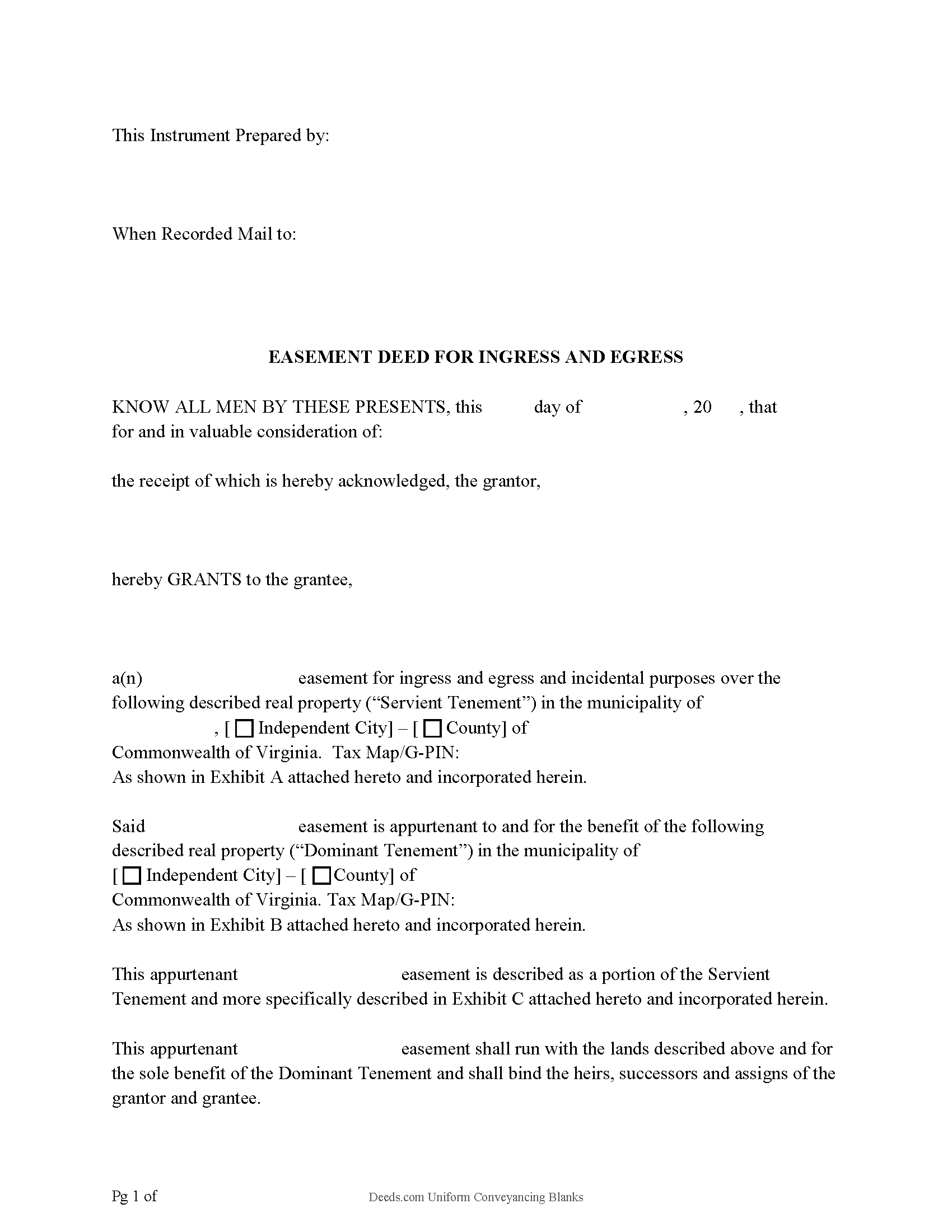
An easement gives a person the right to use another's real property for a specific purpose. This is a non-possessory interest and can relate to solar rights, utility easements, and other types of appurtenant or easements in gross. In Virginia, unless the terms of an easement deed provide otherwise, the owner of a dominant estate cannot use an easement in a way that is inconsistent with the uses allowed by the grant of the easement. Further, the owner of the servient estate cannot engage in an activity or cause any objects to be present upon or adjacent to the burdened land which would unreasonably interfere with the enjoyment of the easement by the owner of the dominant estate ( 55-50.1). The owner of land that is subject to an easement for the purpose of ingress and egress may relocate the easement, on the servient estate, by recording a written agreement evidencing the consent of all affected persons and setting forth the location of the easement. This agreement is to be recorded in the office of the clerk of the circuit court in the county or city where the easement is located ( 55-50). An easement deed should be in writing and should contain the terms of the agreement, the dura... More Information about the Virginia Easement Deed
Termination of Easement
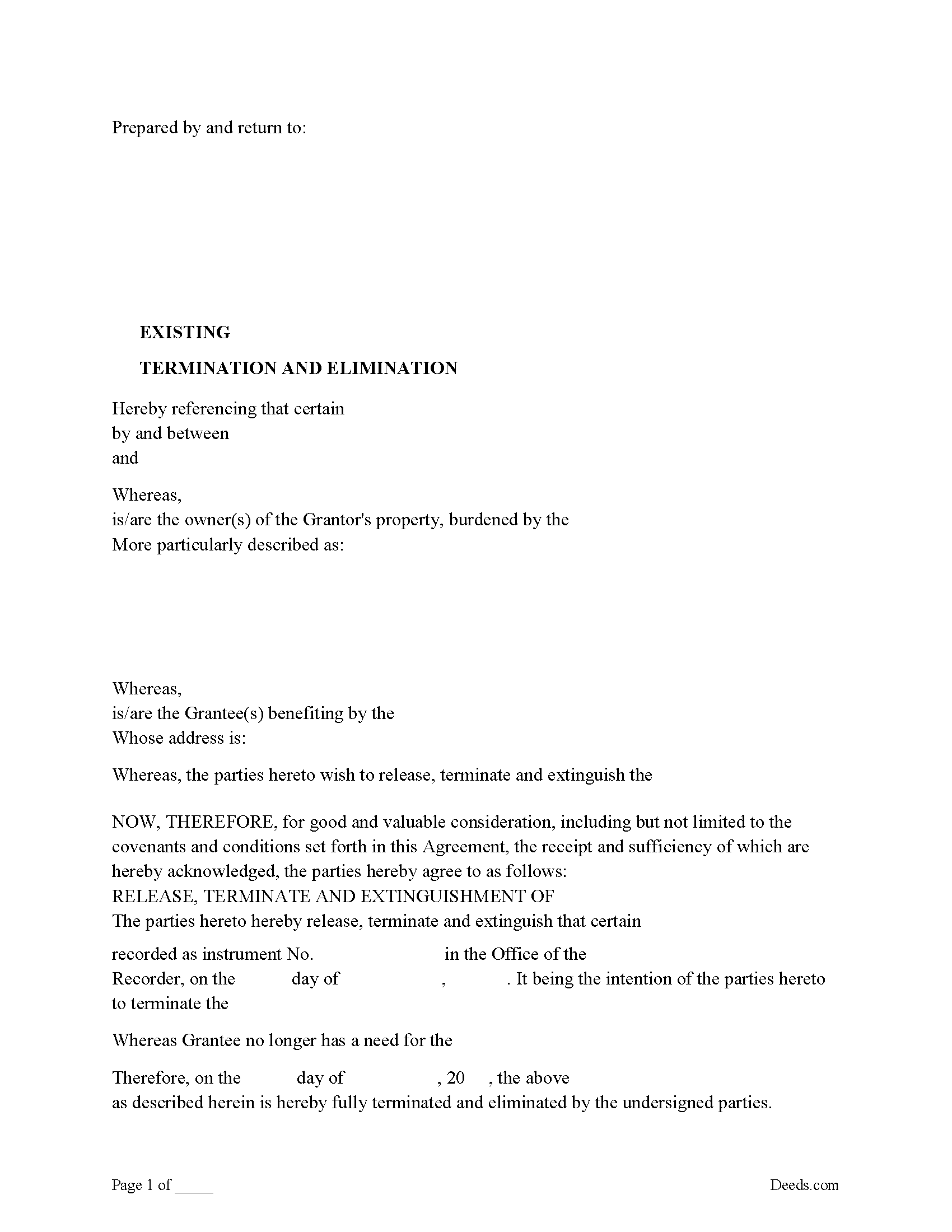
Use this form to release, terminate, extinguish a previously recorded document that involves access to and from a property.
Documents such as:
1. Easement Deeds or Agreements (An easement is a non-possessory interest in land, granting the right to use someone else's property for a specific purpose, like a driveway or utility line)
2. Access Roads
3. Right of Ways
4. Utility Easements (Power, Gas, Water, Sewer, Etc.)
5. Drainage Easements
This document allows the owner of the land, burdened by the access and the party that benefits from the access, to sign an agreement releasing the property from such access, ... More Information about the Virginia Termination of Easement
Special Power of Attorney for the Purchase of Property
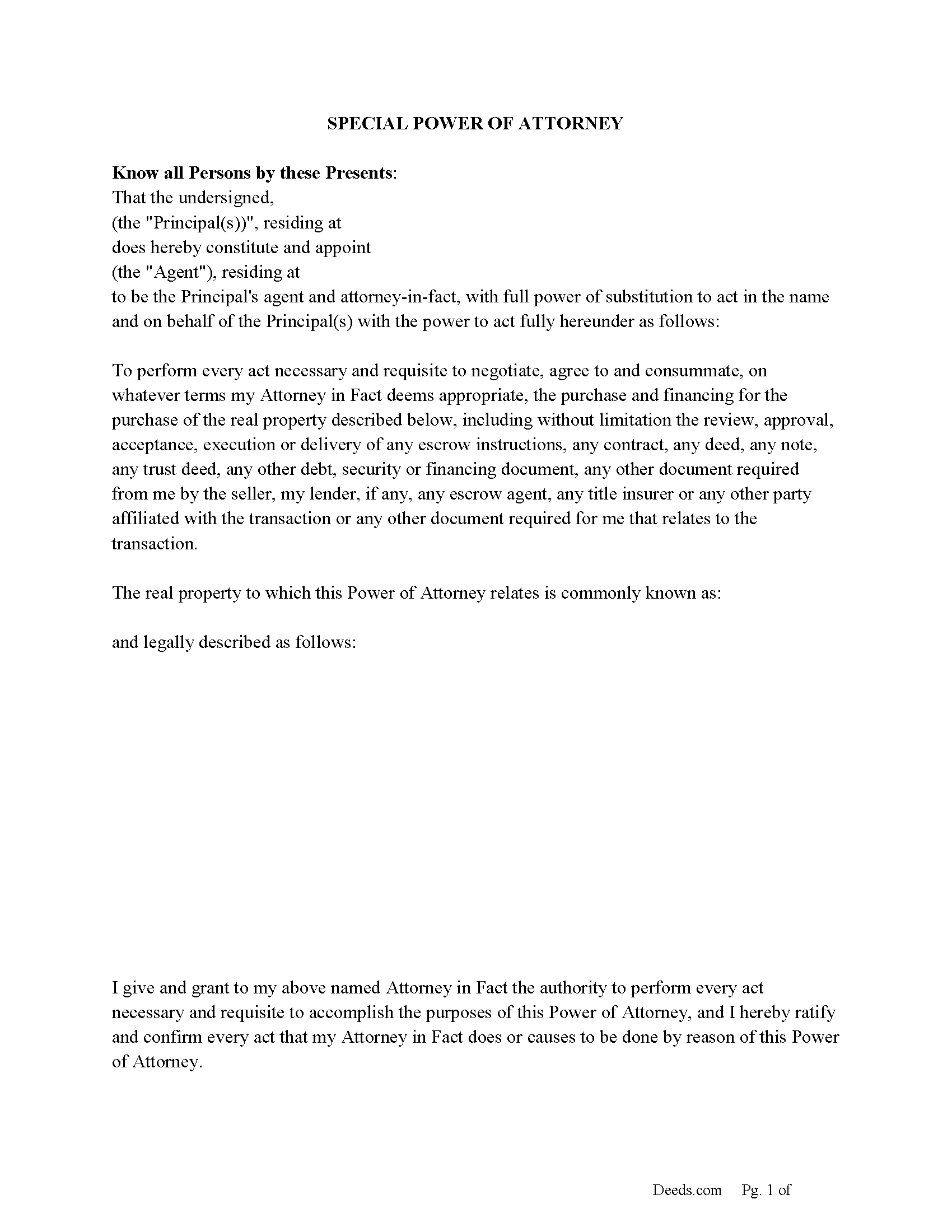
In this form the principal(s) empower(s) an agent to act on the principal's behalf, for the purchase of a real property located in the Commonwealth of Virginia. The agent is authorized to execute purchase and finance instruments and other documents associated with the purchase of the described property. This power of attorney terminates on a date that is provided by the principal. A "Special Instructions" section is included where the agent's powers can be further limited or defined.
This power of attorney is not affected by any subsequent disability or incapacity of the principal and shall be considered a "Durable Power of Attorney."
(ii) shall be governed, as to its validity, terms and enforcement, by those laws of the Commonwealth of Virginia that apply to instruments negotiated, executed, delivered and performed solely within the Commonwealth of Virginia
64.2-1603. (Effective until October 1, 2019) Execution of power of attorney.
A power of attorney shall be signed by the principal or in the principal's conscious presence by another individual directed by the principal to sign the principal's name on the power of attorney. A signature on a power of attorney is presum... More Information about the Virginia Special Power of Attorney for the Purchase of Property
Special Power of Attorney for the Sale of Property
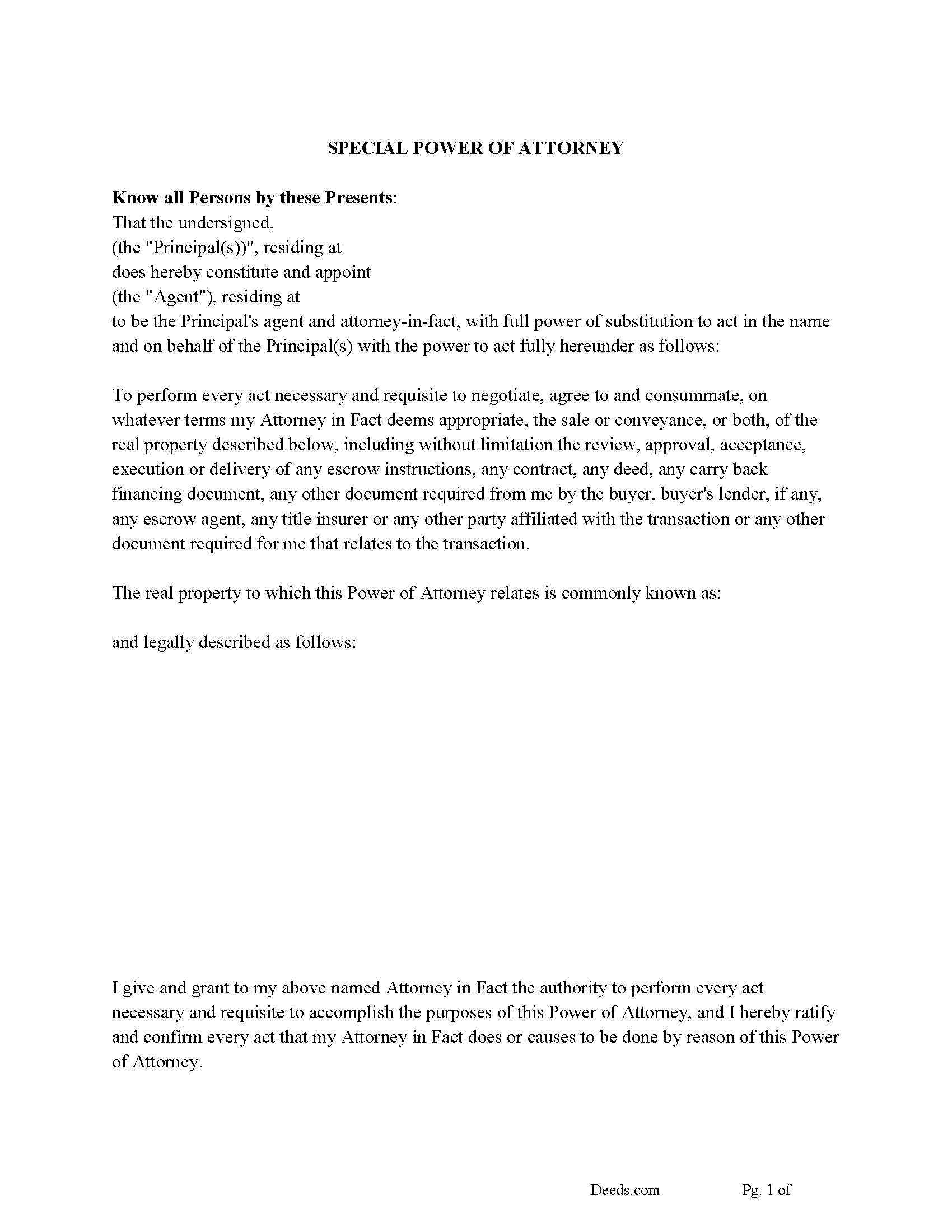
In this form the principal(s) empower(s) an agent to act on the principal's behalf, for the Sale of a real property located in the Commonwealth of Virginia. The agent is authorized to perform every act necessary and requisite to negotiate, agree to and consummate, on whatever terms the Attorney in Fact deems appropriate, the sale or conveyance, or both, of the real property described. This power of attorney terminates on a date that is provided by the principal. A "Special Instructions" section is included where the agent's powers can be further limited or defined.
This power of attorney is not affected by any subsequent disability or incapacity of the principal and shall be considered a "Durable Power of Attorney."
(ii) shall be governed, as to its validity, terms and enforcement, by those laws of the Commonwealth of Virginia that apply to instruments negotiated, executed, delivered and performed solely within the Commonwealth of Virginia
64.2-1603. (Effective until October 1, 2019) Execution of power of attorney.
A power of attorney shall be signed by the principal or in the principal's conscious presence by another individual directed by the principal to sign the prin... More Information about the Virginia Special Power of Attorney for the Sale of Property
Deed of Trust and Promissory Note

A Deed of Trust (DOT), is a document that conveys title to real property to a trustee as security for a loan until the grantor (borrower) repays the lender according to terms defined in an attached promissory note. It's similar to a mortgage but differs in that mortgages only include two parties (borrower and lender).
In the Commonwealth of Virginia, a Deed of Trust is the most commonly used instrument to secure a loan. Foreclosure can be done non-judicially, saving time and expense. This process is called a Trustee Sale.
There are three parties in this Deed of Trust:
1- The Grantor (Borrower)
2- Beneficiary (Lender) and a
3- Trustee (Neutral Third Party) (Our guidelines will show how to choose a Trustee at little to no cost)
Basic Concept. The Trustor (Borrower) conveys property title to a Trustee (Neutral Party). A Trustee or beneficiary/Lender can take an action against any person for damages.
Due on Sale Clause: It allows the lender to call or modify the loan if the borrower conveys/sells the property. ("Notice - The debt secured hereby is subject to call in full or the terms thereof being modified in the event of sale or conveyance of the property conveyed.") Requi... More Information about the Virginia Deed of Trust and Promissory Note
Certificate and Affidavit of Satisfaction of Deed of Trust
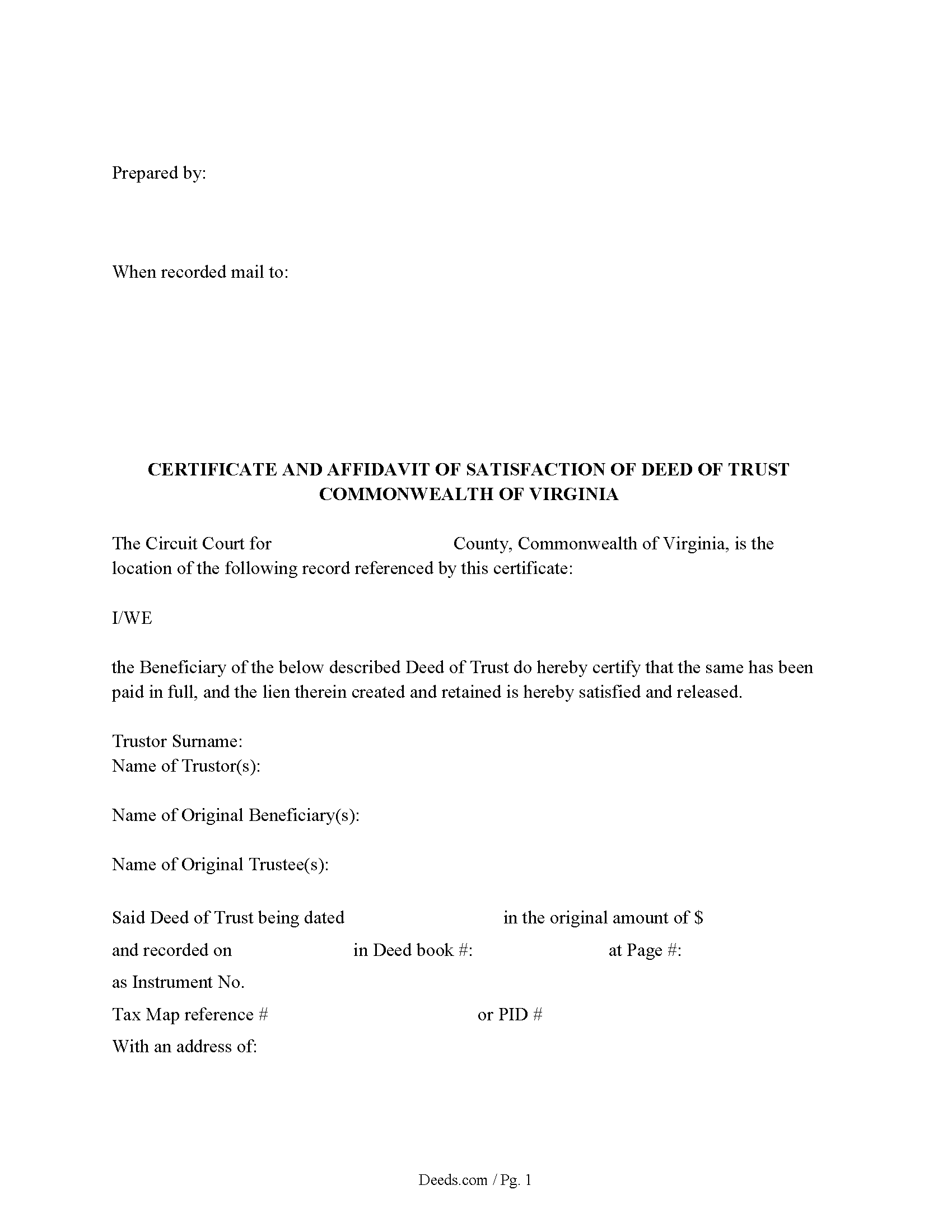
Use to release a deed of trust, when the debt has been paid in full.
This form is executed by:
1. A creditor/lender (or his duly authorized agent, attorney, or attorney-in-fact or any person to whom the instrument evidencing the indebtedness has been endorsed or assigned for the purpose of effecting such release.) VA Code statute 55.1-339(C).
2. Or a Settlement Agent, Pursuant to authority granted by Virginia Code 55.1-339(E).
3. Or a Title Insurance Company, Pursuant to authority granted by Virginia Code 55.1-339(E).
Included forms that me be required.
"NOTICE OF INTENT TO RELEASE"
"AFFIDAVIT OF SETTLEMENT AGENT OR TITLE INSURANCE COMPANY"
(Virginia Satisfaction of DOT Package includes form, guidelines, and completed example) For use in the Commonwealth of Virginia only.
... More Information about the Virginia Certificate and Affidavit of Satisfaction of Deed of Trust
Certificate of Partial Satisfaction of Deed of Trust
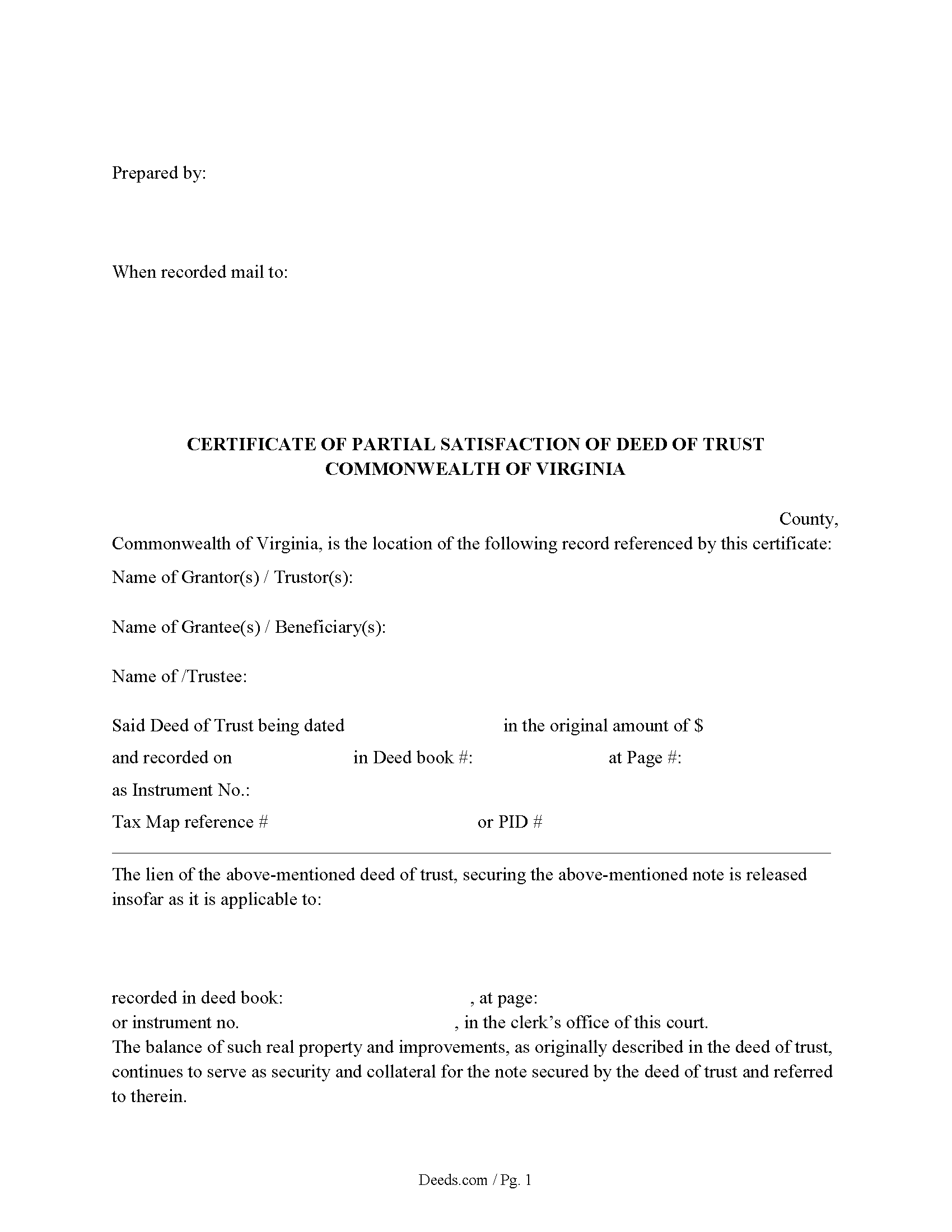
Use this form to release a portion of property secured by a deed of trust and promissory note. Example: borrower has financed 4 lots for $100,000.00 which has since been paid down to a balance of $25,000.00. Borrower approaches Lender/grantee and would like the lender to release lot #3 because he has a buyer. The lender might think, ok- he will owe me $25,000.00 on the remaining 3 lots, I consider this a good risk. The same can also be applicable to condominiums, apartments, parcels, etc.
(It is lawful for any lien creditor to record a certificate of partial satisfaction of any one or more of the separate pieces or parcels of property covered by such lien. It shall also be lawful for any such creditor to record a certificate of partial satisfaction of any part of the real estate covered by such lien if a plat of such part or a deed of such part is recorded in the clerk's office and a cross-reference is made in the certificate of partial satisfaction to the book and page where the plat or deed of such part is recorded. Such certificate of partial satisfaction may be accomplished in manner and form prescribed in this chapter for making certificates of satisfaction, except that the... More Information about the Virginia Certificate of Partial Satisfaction of Deed of Trust
Transfer on Death Deed
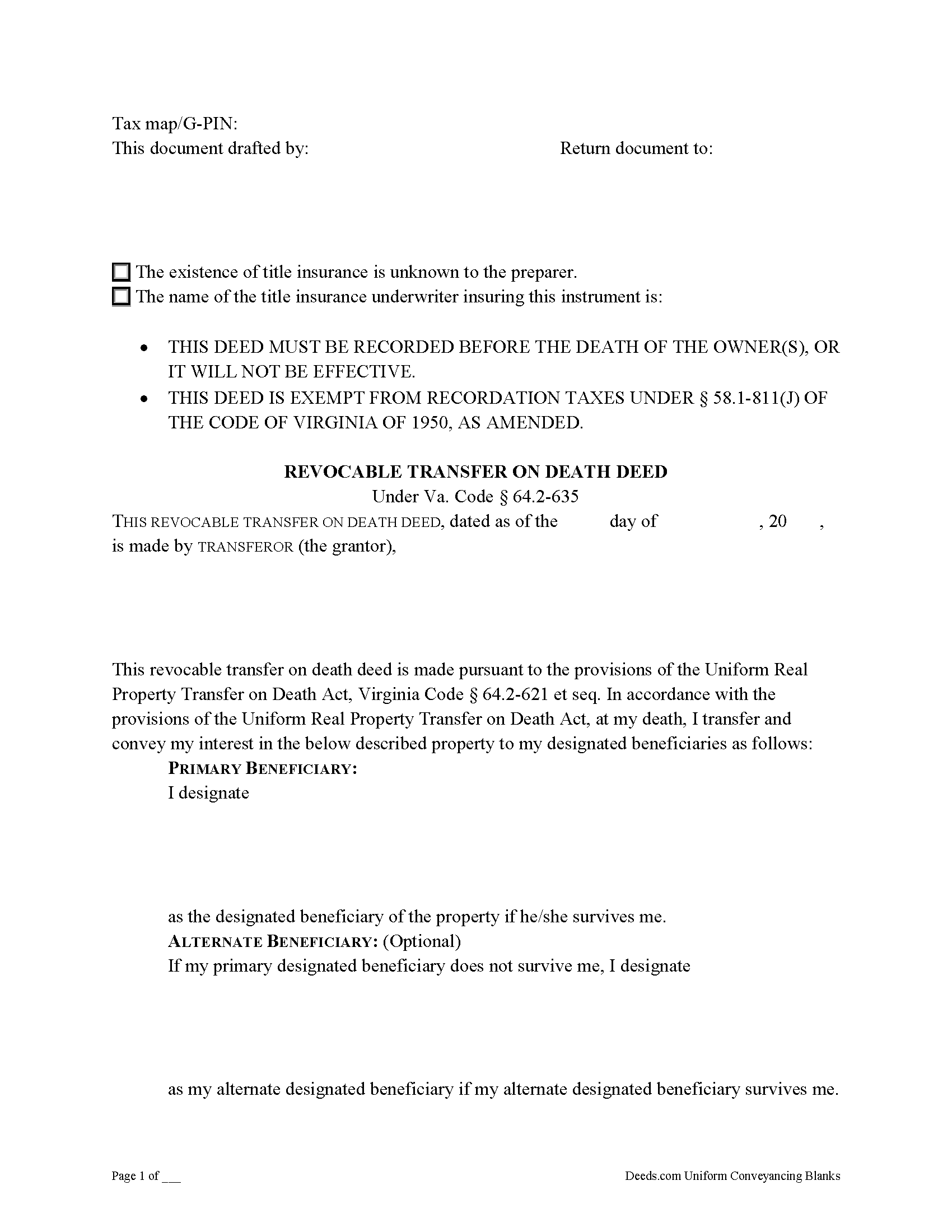
Virginia's statutory transfer on death deed became effective on July 1, 2013. These deeds are governed by the Uniform Real Property Transfer on Death Act (URPTODA), which is incorporated into the Virginia statutes at 64.2-621 et seq.
A transfer on death deed is an instrument that allows owners of Virginia real estate to convey land to chosen beneficiaries without the need for a will or probate distribution ( 64.2-624). To be valid, the completed and notarized form must, among other things, meet the same standards as a regular inter vivos deed (one that transfers title while the owner is still living); state that the transfer will only occur at the owner/transferor's death; and be recorded <i>while the transferor is alive</i> in the land records at clerk's office of the county where the property is located ( 64.2-628).
The deeds are revocable, which means that while alive, the owner retains 100% control over the property, may use or sell it as desired, and may also redirect, modify, or even cancel the future transfer at will. As a result, there is no requirement for notice, delivery, acceptance, or consideration, all necessary for standard deeds ( 64.2-629). This is possible... More Information about the Virginia Transfer on Death Deed
Transfer on Death Revocation
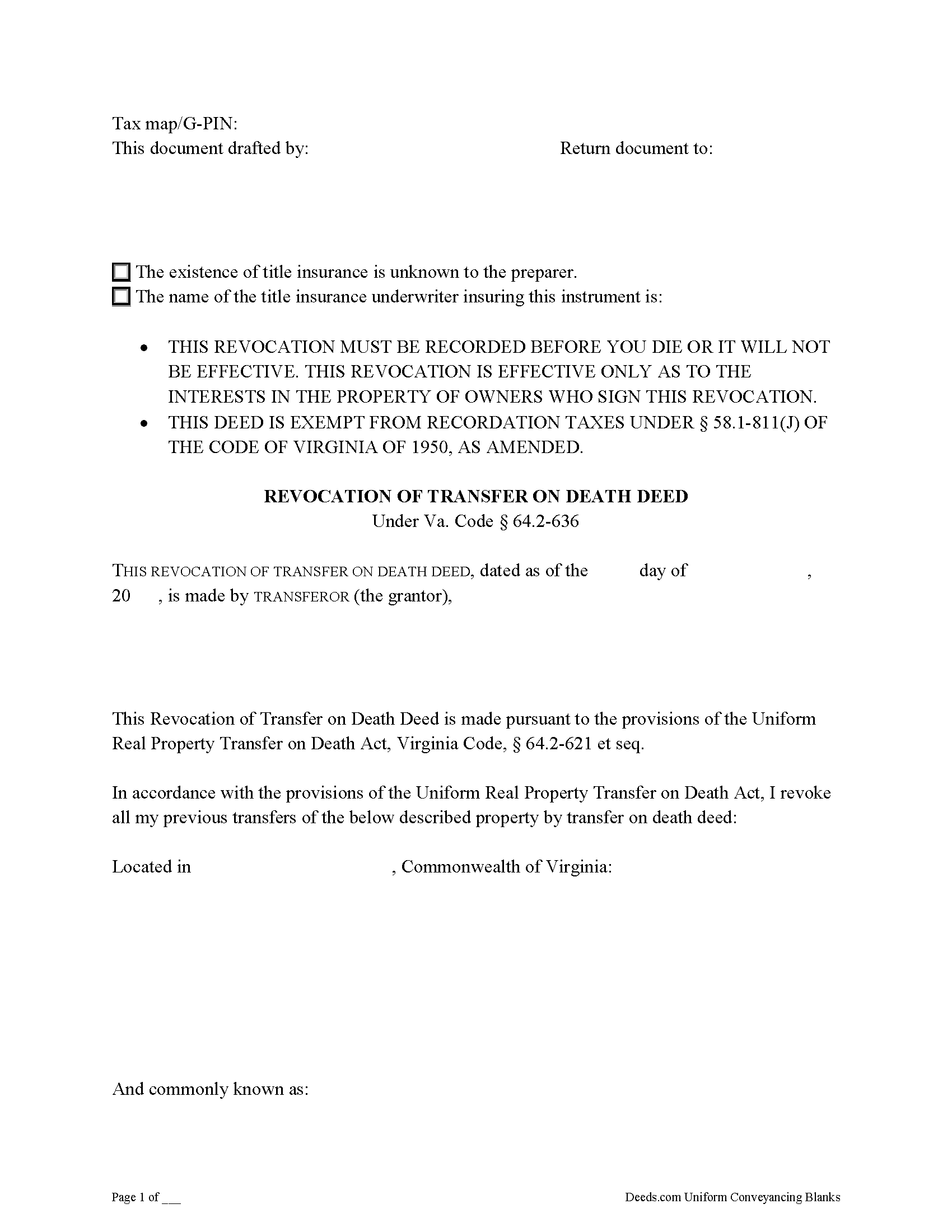
As of July 1, 2013, Virginia joined the growing number of states allowing transfer on death deeds. These instruments are governed by the Uniform Real Property Transfer on Death Act (URPTODA), which is incorporated into the Virginia statutes at 64.2-621 et seq.
One of the most useful characteristics of this estate planning tool is its flexibility. Life is unpredictable, and it's important to update wills and other documents dealing with what happens after death. For most deeds, once the owner/transferor signs and records the document, the transfer of title is completed and permanent. With transfer on death deeds, though, recording the executed form sets out the owner's intended plans for the property, but only after his/her death -- while alive, the owner maintains absolute control over and possession of the real estate. Because the conveyance is only for a potential future interest, and generally involves no consideration (money or something else of value given in exchange for the property), these deeds can be revoked for any reason, and at any time during the owner's life.
The Virginia statutes define the processes available for revoking a transfer on death deed at 64.2-6... More Information about the Virginia Transfer on Death Revocation
Transfer on Death Beneficiary Affidavit
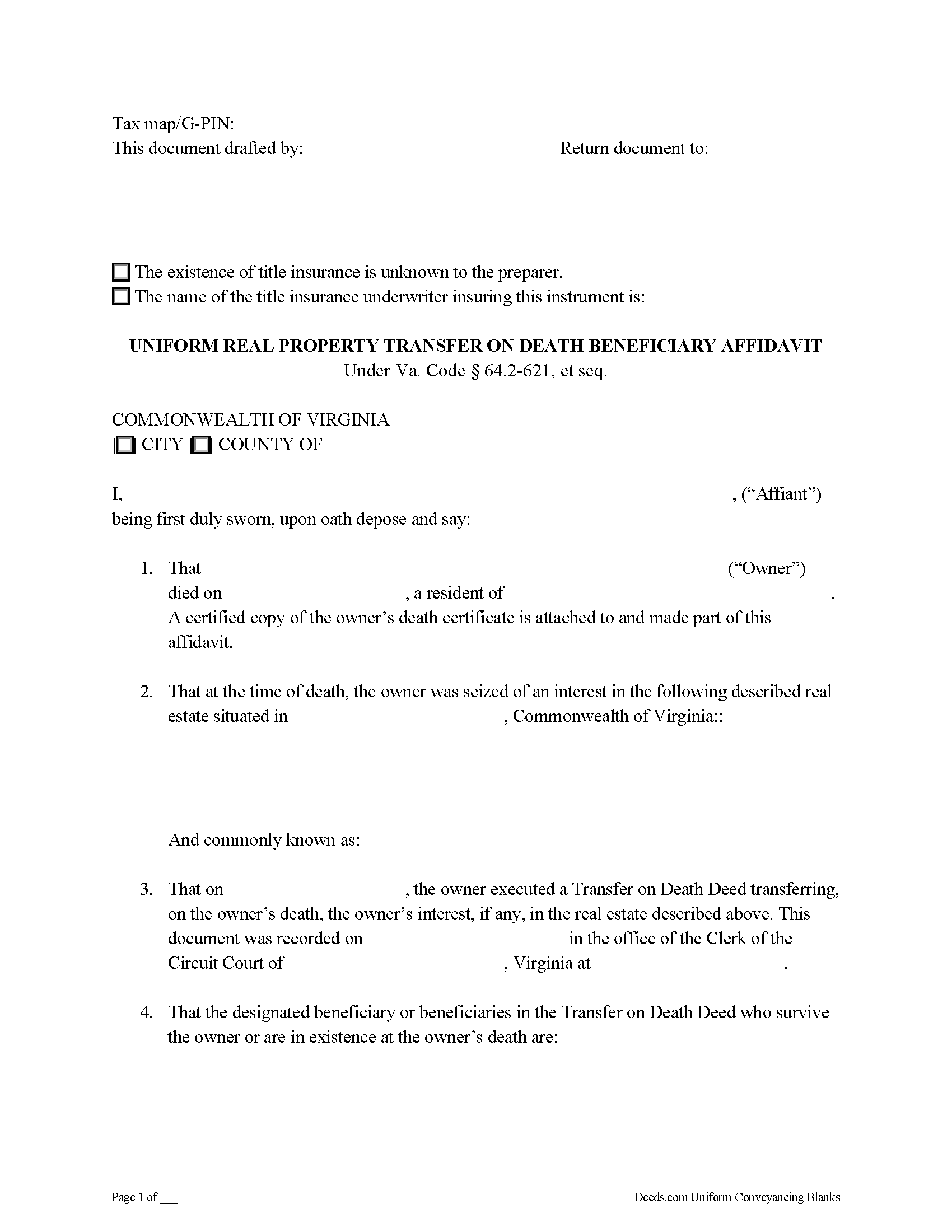
On July 1, 2013, Virginia enacted the Uniform Real Property Transfer on Death Act, codified at VA Code 64.2-621 et seq. (2012).
While the statutes contain suggested forms for the actual transfer on death deeds and associated revocations, the specifics for completing the transfer after the owner dies are less clear. In many cases, non-probate transfers of real property happen "as a function of law." In theory, this means there is no need for the beneficiary to act -- the named owner of the property automatically changes. In practice, however, it benefits the interests of all parties involved to formalize the updated status as soon as reasonably possible, especially since the beneficiary has the right to disclaim the conveyed interest.
One efficient method for stating the beneficiary's intent to accept the real estate is to execute and record an affidavit, which is a document containing statements made under oath. The affidavit should, at minimum, include:
1. The parties named in the transfer on death deed;
2. Residency and death information about the deceased owner;
3. Recording details for the transfer on death deed;
4. A description of and property ID for t... More Information about the Virginia Transfer on Death Beneficiary Affidavit
Personal Representative Deed
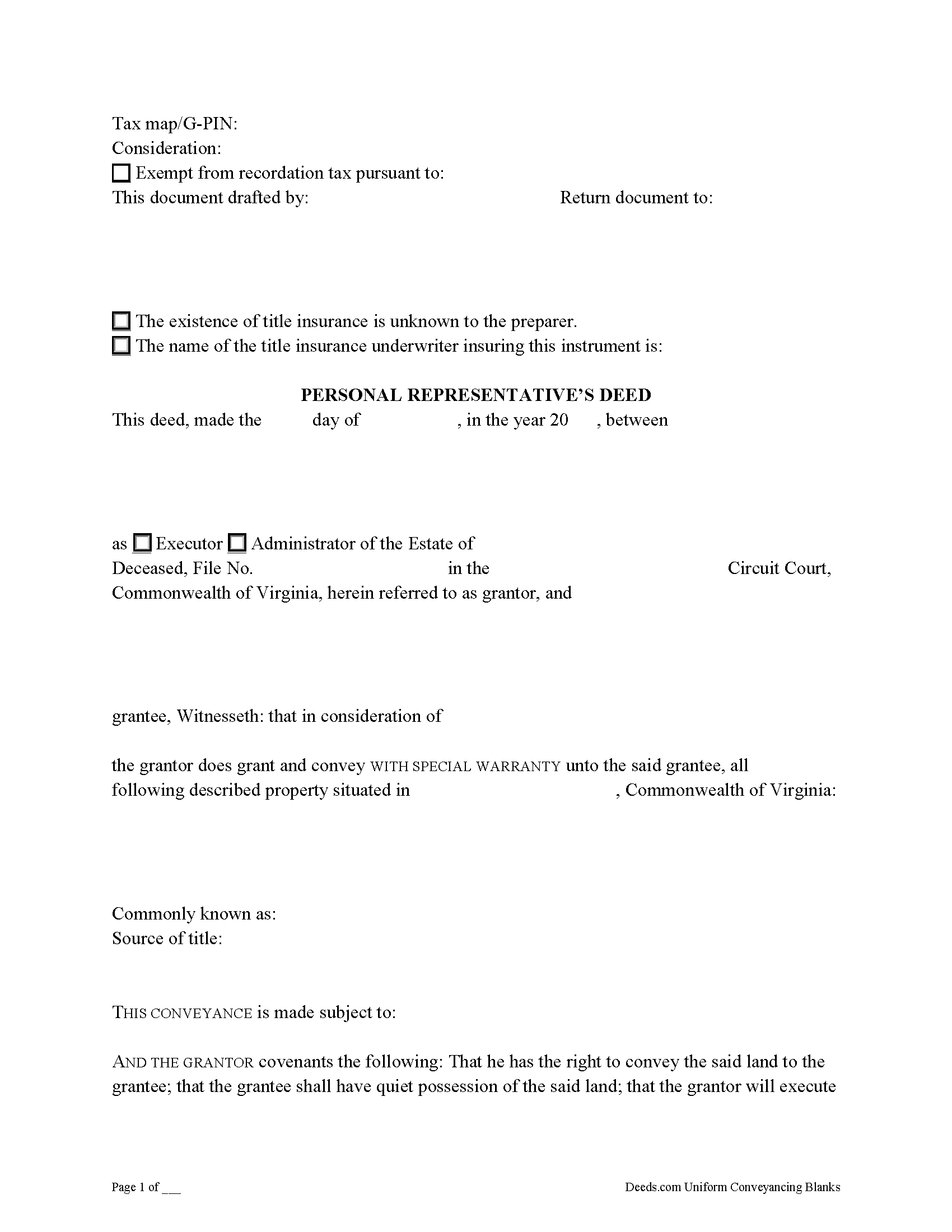
Probate is the legal process of settling a decedent's estate and distributing his property to devisees according to the provisions of a will or to heirs at law. A personal representative is the fiduciary confirmed by the court to administer the estate. When the decedent dies with a will, this person is called the executor. When the decedent dies without a valid will (intestate), this person is called the administrator.
A decedent's real estate passes to the beneficiaries named in his will as part of the probate process, subject to the executor's power of sale, if such power is included in the will. Intestate property passes pursuant to the course of descents established at 64.2-200, first to surviving spouse, then to decedent's children. It does not come under control of the administrator unless specified by court order.
When the decedent's will specifically directs the sale of real estate, the personal representative (either executor or administrator with the will annexed) may sell and convey the property (64.2-521). A testator (will maker) may incorporate fiduciary powers into his will, including the power to sell, transfer, and convey real property and execute and deliver ... More Information about the Virginia Personal Representative Deed
Real Estate Affidavit
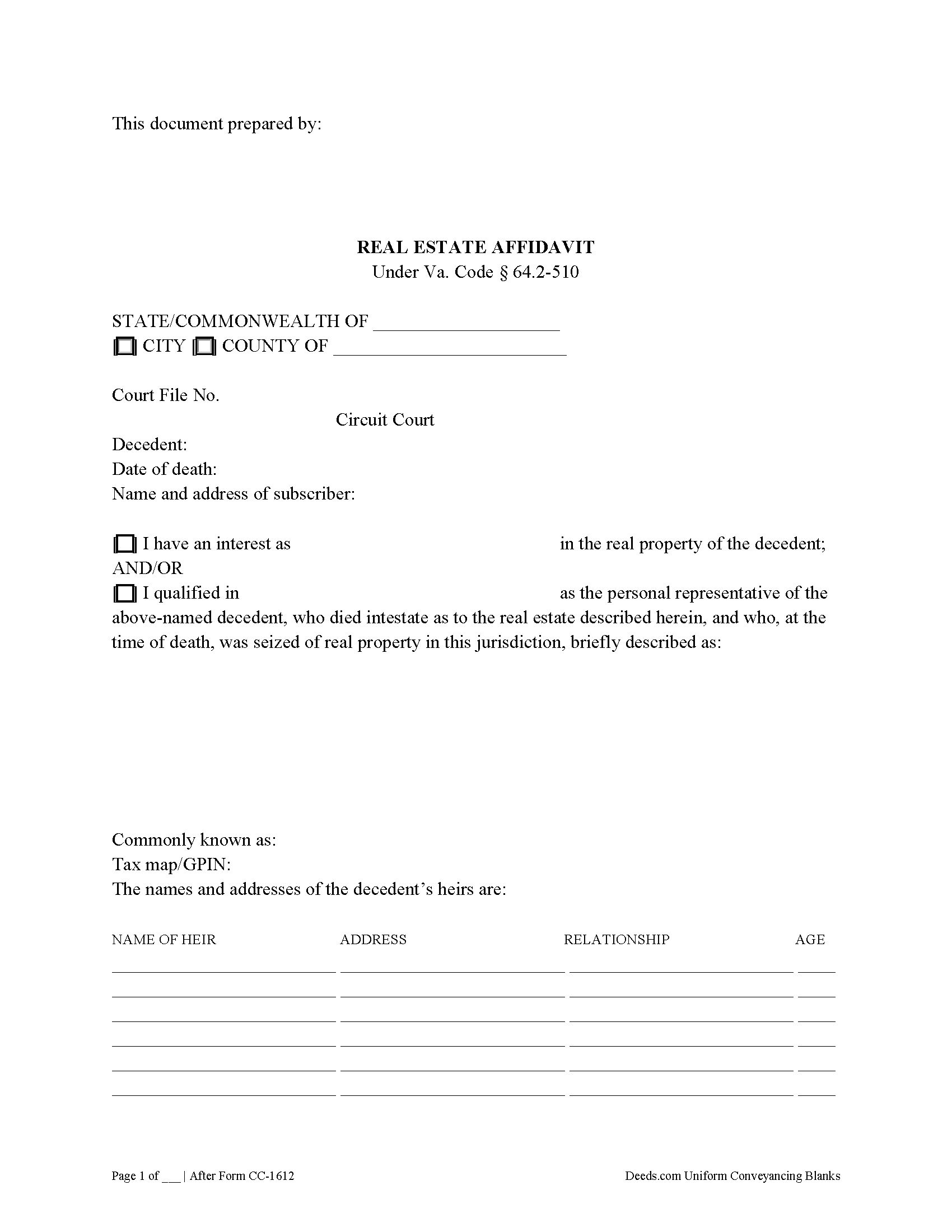
When a decedent dies intestate (without a valid will), his probate property passes according to the course of descents, codified at Va. Code 64.2-200. The course of descents is an ordered list of heirs at law who have priority to inherit the estate when the decedent fails to provide instruction in a will. The administrator of the estate must compile a list of heirs in compliance with Va. Code 64.2-509 to determine who has an interest in the estate. The inheritance of property by an intestate decedent's heirs is sometimes referred to as intestate succession.
If the intestate decedent dies owning real property, any person having an interest in the estate, including the qualified personal representative, can execute and record an affidavit of real estate under Va. Code 64.2-510. Upon recording, the clerk of the circuit court will notify the commissioner of the revenue, who in turn transfers the real estate in the land books (64.2-510(B)). Once recorded, the affidavit transfers all interest in the described real estate owned by decedent to the heirs listed and evidences the change of ownership to the property.
The affidavit (Form CC-1612) gives the file number of the probate and... More Information about the Virginia Real Estate Affidavit
Trustee Deed
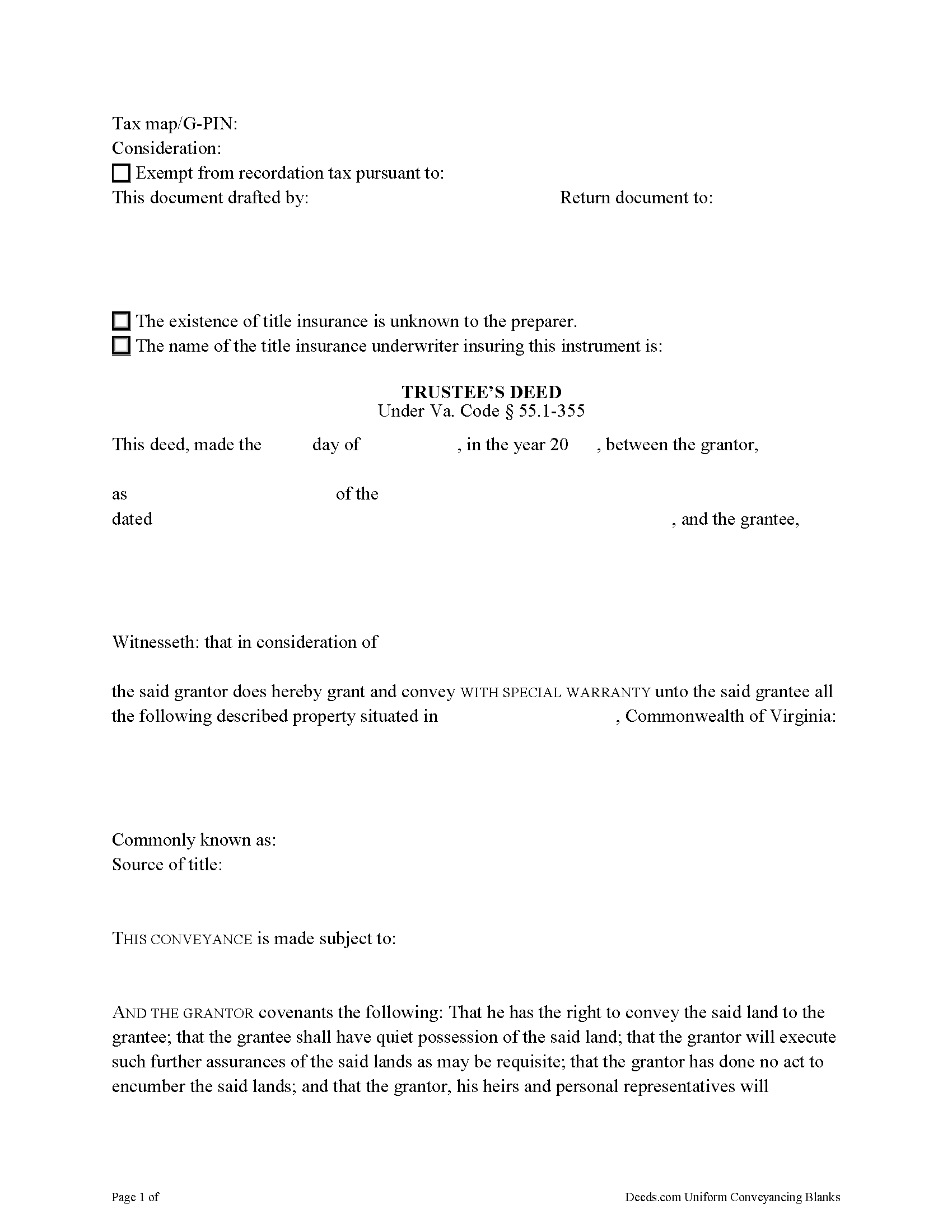
Transferring Real Property from a Living Trust Using a Virginia Trustee's Deed
A trustee's deed conveys interest in real property held in a living (inter vivos) trust. The deed is named for the granting party, the trustee, who holds legal title to property contributed to the trust by the trust's settlor. A settlor is any person who creates or contributes property to a trust by transferring it to another. Property held in trust is administered by the trustee for the benefit of a trust beneficiary. In most living trusts, the settlor designates himself as trustee and names a successor, who will take over fiduciary duties upon the settlor's death or incapacitation.
The trust is established by a written instrument executed by the settlor and governed by the Uniform Trust Code, codified in Virginia at Va. Code Ann. 64.2-7. The trust instrument contains the terms of the trust and sets forth the settlor's estate plan. The document names the trustees and enumerates the trustee's powers in acting on behalf of the trust, and designates the trust beneficiary or beneficiaries. Generally, the settlor designates himself as the living trust's beneficiary during his lifetime, and identifies ... More Information about the Virginia Trustee Deed
Certificate of Trust
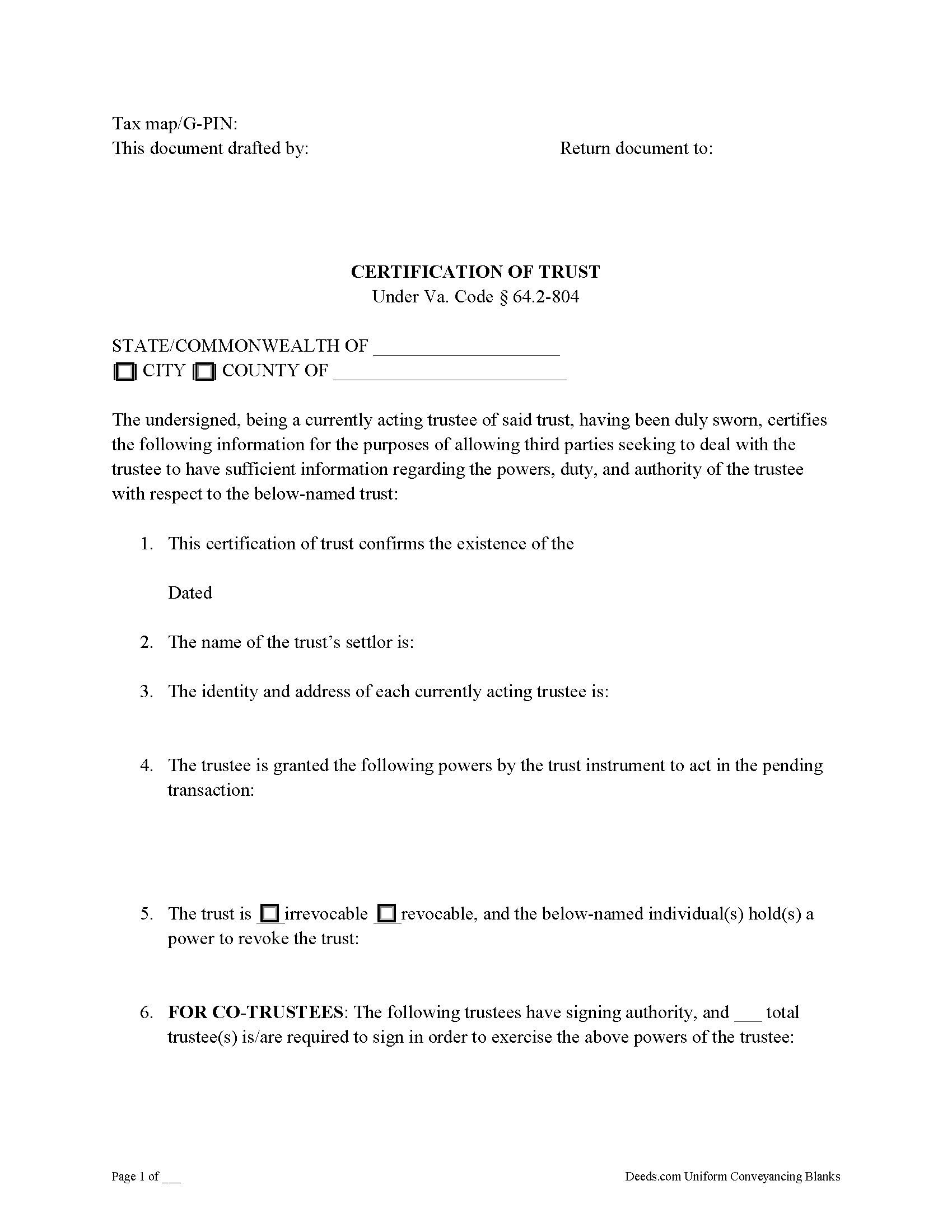
Signed by a currently acting trustee, a certification or certificate of trust under Va. Code Ann. 64.2-804 is a document summarizing a trust in lieu of the trust instrument, and contains certified statements affirmed by the trustee in the presence of a notary public. The document confirms the existence of the subject trust and the trustee's capacity and relevant powers, and is presented in support of a transaction involving trust property.
A certificate of trust is frequently recorded alongside a trustee's deed or acquisition of real property by the trust, though recording of the document is not required by Virginia Code. Instead of disclosing the settlor's estate plan by providing the entire trust instrument, the certificate allows a trustee to provide parties outside of the trust arrangement (anyone who is not a trust beneficiary) only the essential information necessary to conduct the business at hand. Recipients of a certificate "may assume without inquiry the existence of the facts contained" within it ( 64.2-804(F)).
Requirements of a certificate include statements that the trust exists and that it has not been revoked or modified in a way that would invalidate the co... More Information about the Virginia Certificate of Trust
Mineral Deed
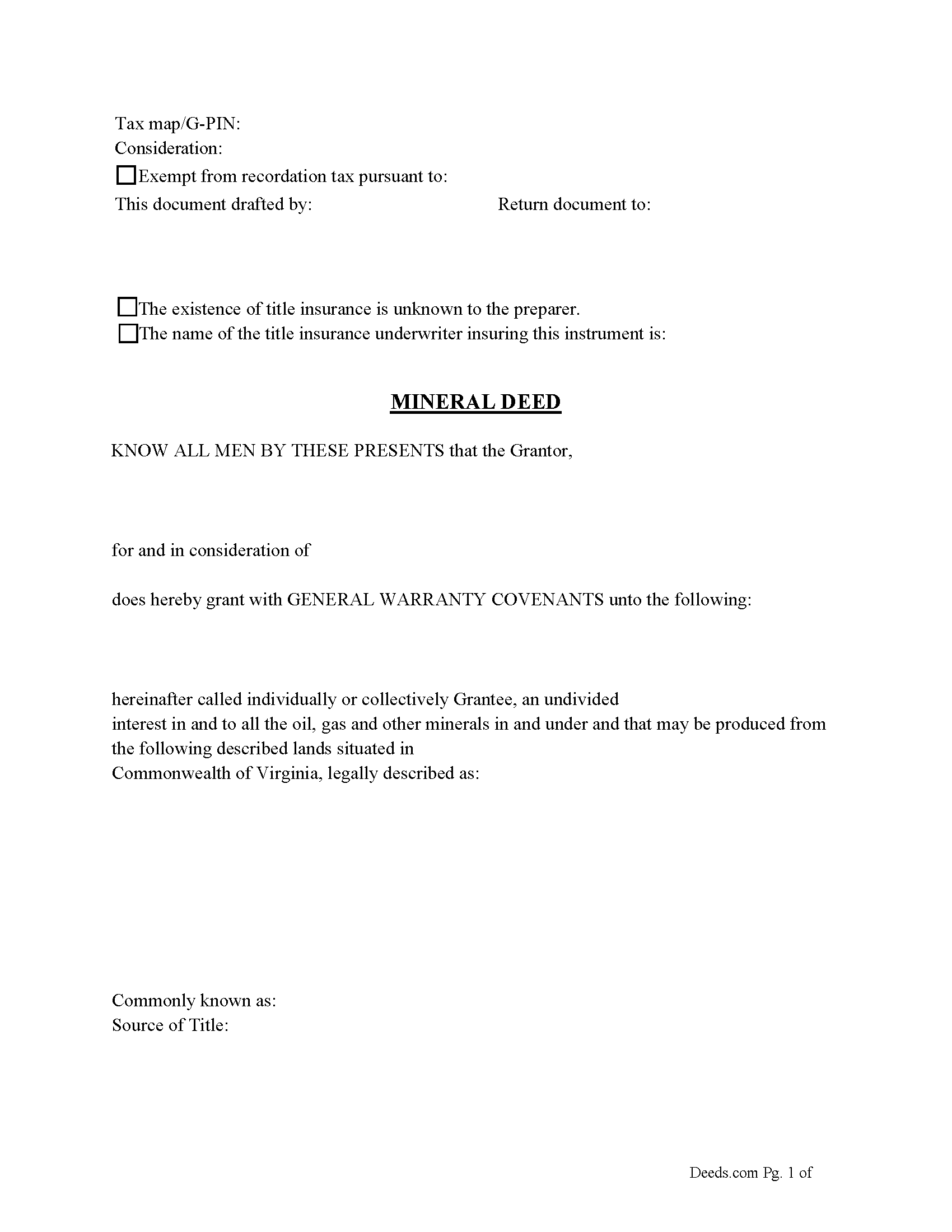
The General Mineral Deed in Virginia transfers oil, gas, and mineral rights from the grantor to the grantee. THIS IS NOT A LEASE. There are no Exceptions or Reservations included.
The transfer includes the oil, gas and other minerals of every kind and nature. It also transfers any and all rights to receive royalties, overriding royalties, net profits interests or other payments out of or with respect to those oil, gas and other minerals. The Grantor can stipulate the percentage of Mineral Rights the Grantee will receive and is made subject to any rights existing under any valid and subsisting oil and gas lease or leases of record.
This general mineral deed gives the grantee the right to access, for the purpose of mining, drilling, exploring, operating and developing said lands for oil, gas, and other minerals, and storing handling, transporting and marketing of such.
In this document the Grantor Warrants and will defend said Title to Grantee. Use of this document has a permanent effect on your rights to the property, if you are not completely sure of what you are executing seek the advice of a legal professional.
(Mineral Deed Package includes form, guidelines, and comp... More Information about the Virginia Mineral Deed
Quitclaim Mineral Deed
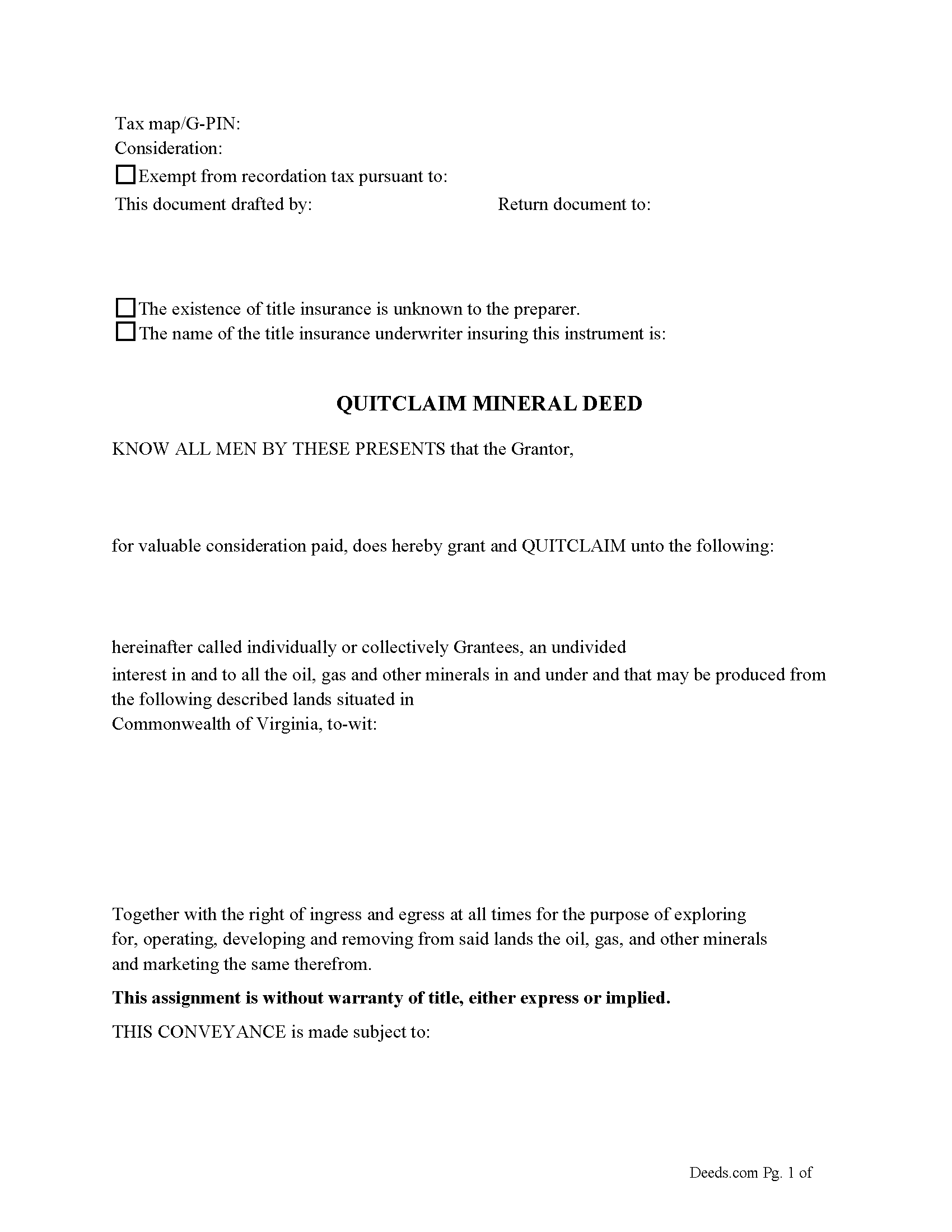
The General Mineral Deed in Virginia Quitclaims oil, gas, and mineral rights from the grantor to the grantee. THIS IS NOT A LEASE. There are no Exceptions or Reservations included.
The transfer includes the oil, gas and other minerals of every kind and nature. The Grantor can stipulate the percentage of Mineral Rights the Grantee will receive.
This general mineral deed gives the grantee the right to access, for the purpose of mining, drilling, exploring, operating and developing said lands for oil, gas, and other minerals, and storing handling, transporting and marketing of such.
The seller, or grantor Quitclaims the mineral rights and does NOT accept responsibility to any discrepancy of title (This assignment is without warranty of title, either express or implied)
Uses: Mineral deeds with quitclaim are often used in situations where the grantor wants to quickly release any interest they might have in mineral rights, such as in settling estates, resolving disputes, clearing up uncertainties about ownership in a title's history or when mineral rights have previously been severed or fragmented from surface rights and cloud a title, making it difficult to transfer propert... More Information about the Virginia Quitclaim Mineral Deed
Corrective Affidavit
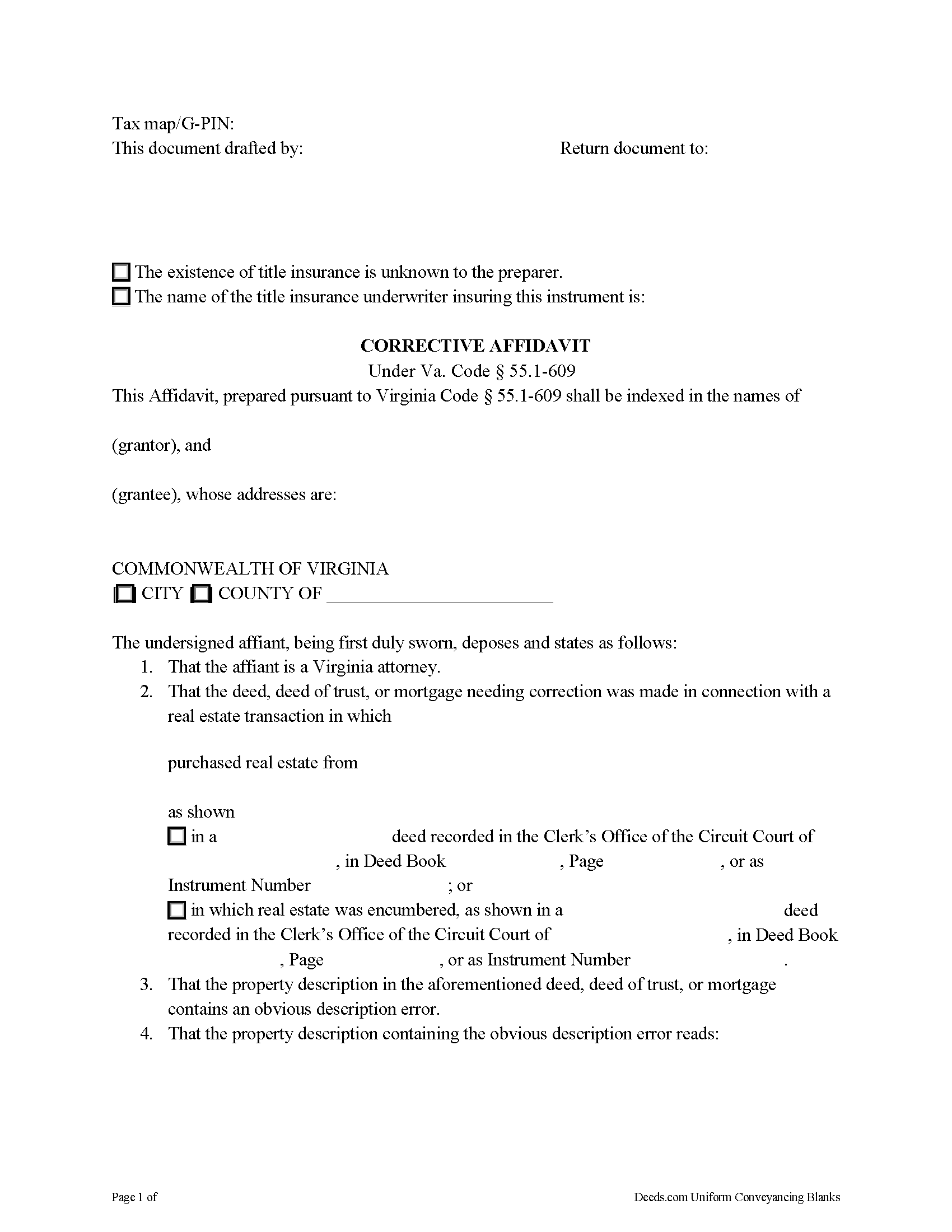
A corrective affidavit under Va. Code Section 55.1-609 is a statutory form for correcting an obvious description error in a recorded deed, deed of trust, or mortgage. Note that the affidavit must be executed by an attorney licensed by the Virginia State Bar.
The statutes classify an "obvious description error" as an error transcribing courses and distances; an error incorporating a recorded plat or deed reference; an error in lot number or designation; or an omitted exhibit supplying the legal description of the subject parcel.
The contents of a statutory corrective affidavit include the original grantor's and grantee's names and the place where the original deed was recorded. It includes both the property description containing the error and the corrected property description. The affidavit is signed by a Virginia attorney and notarized.
Prior to recording the affidavit, the attorney delivers a copy to all parties to the deed, deed of trust, or mortgage containing the error and to the title insurance company, if applicable, and gives notice of intent to record the affidavit. If no objection is received within 30 days of receipt of notice, the attorney may record the affid... More Information about the Virginia Corrective Affidavit
Mechanics Lien Preliminary Notice
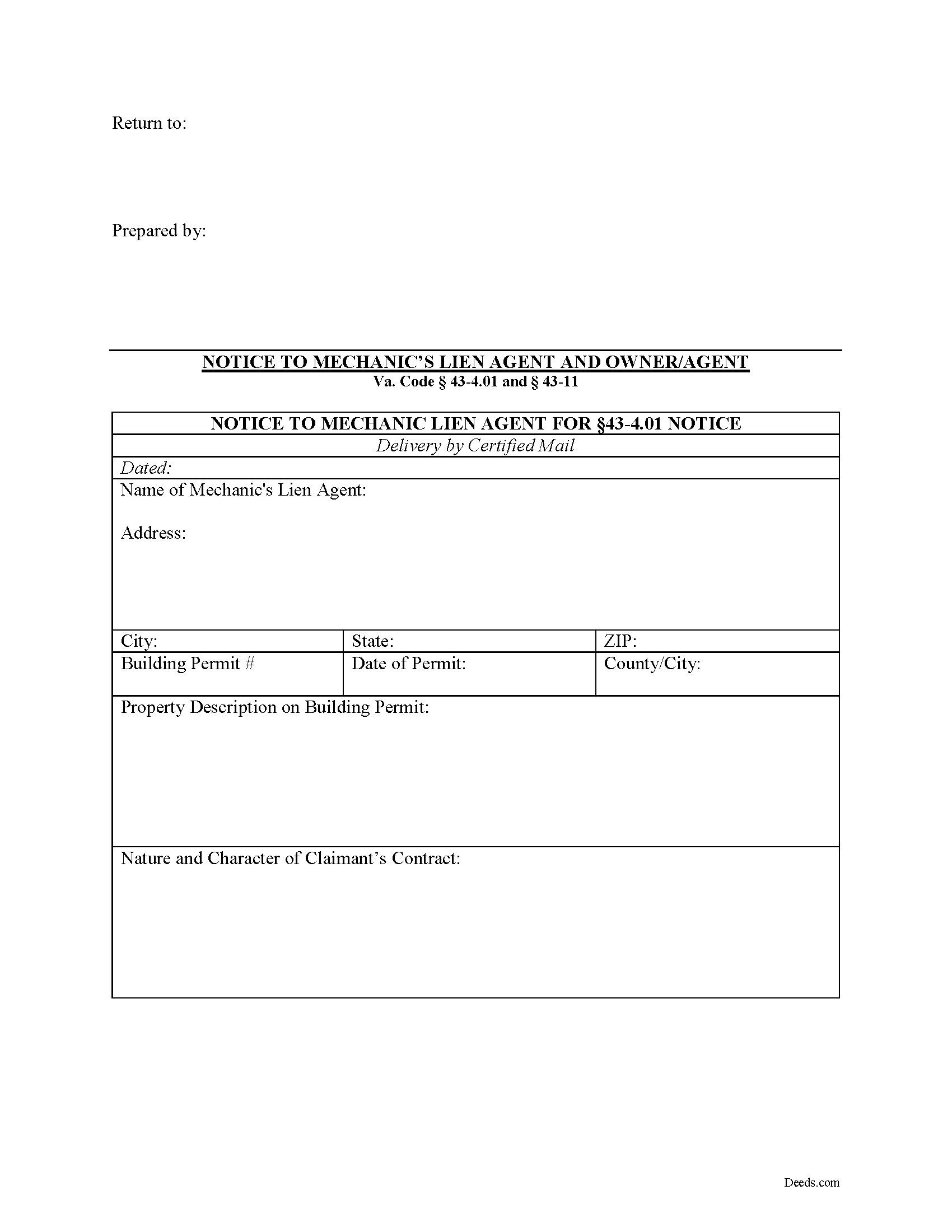
Preliminary Notice in Virginia
Mechanic's liens require strict procedural compliance. To successfully claim a mechanic's lien, the claimant must first provide all entitled parties with the appropriate form of preliminary notice. This is because a mechanic's lien creates an encumbrance, or block on the owner's title, and therefore, the owner and other parties potentially affected by that must receive notice of the process. In Virginia, the form of required notice is served on a party known as a "Lien Agent" as well as on the property owner. A Lien Agent is an appointed individual, usually an attorney or title agent. This Notice to Lien Agent and/or Owner/Agent contains a separate form for notifying each party (or one and not the other).
To draft a Notice to Lien Agent or Owner/Agent, first you will need a copy of the building permit. The building permit for any one- or two-family residential dwelling unit issued pursuant to the Uniform Statewide Building Code must also be conspicuously and continuously posted on the property for which the permit is issued until all the work is completed on the property. Va. Code 43-4.01(A). Ensure that the permit is posted on the property bef... More Information about the Virginia Mechanics Lien Preliminary Notice
General Contractor Memorandum for Mechanics Lien
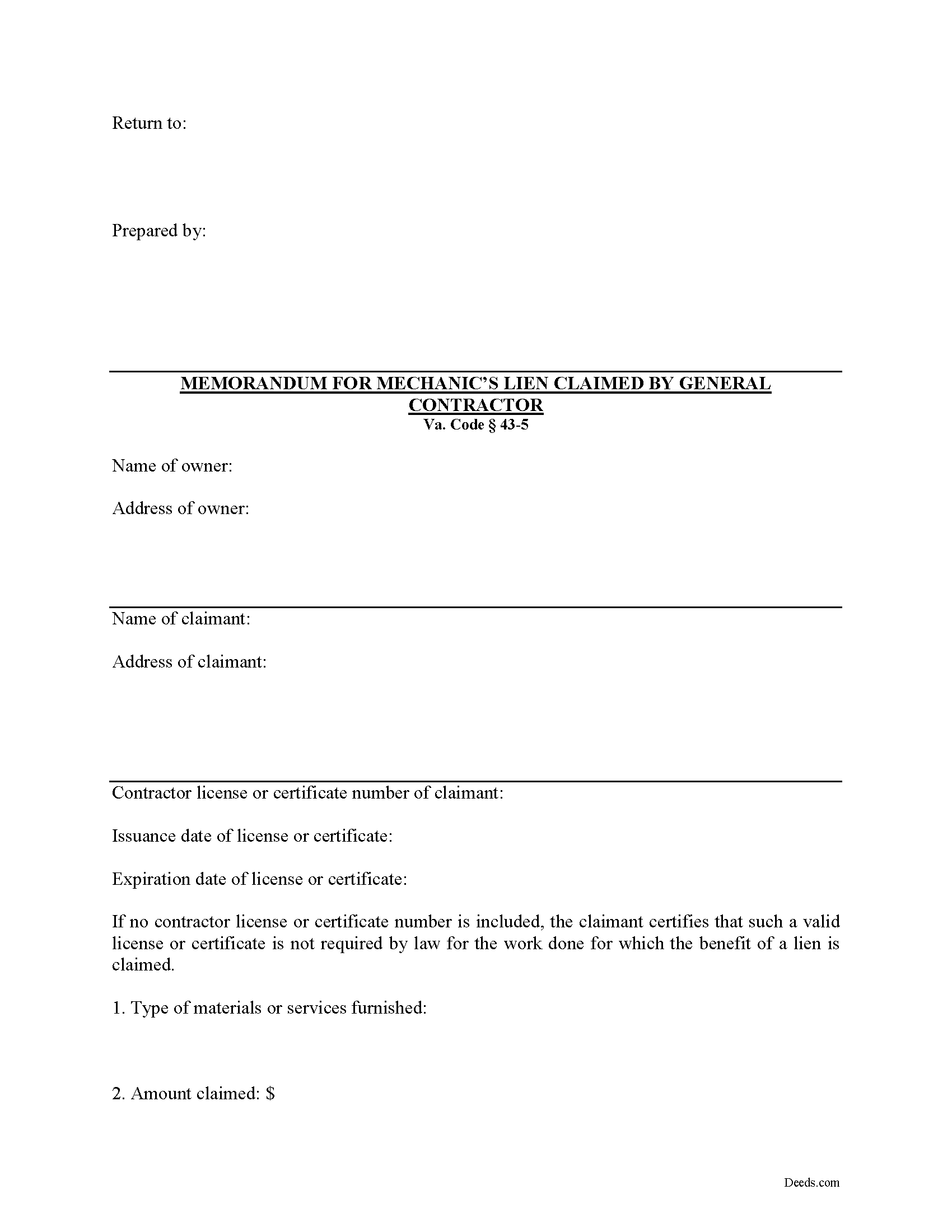
Virginia Mechanic's Lien by a General Contractor
In Virginia, a lien claimant may make a claim for a mechanic's lien by completing and recording a "Memorandum for Mechanic's Lien" document. There are separate versions of the Memorandum depending on whether the claimant is a contractor, subcontractor, or sub-subcontractor.
In general, a mechanic's lien claim becomes available when a property owner or other person in the chain has not paid the contractor or others owed payment. The lien works as a security device by placing an encumbrance on the property, which in turn prompts the property's owner to pay in order to remove the lien. Liens can also be sought against payment funds, for example, by preventing a contractor from being paid by the owner until the subcontractors are paid.
A general contractor must file a memorandum of lien at any time after the work is commenced or material furnished, but not later than 90 days from the last day of the month in which he last performs labor or furnishes material, and no later than 90 days from the time the project is completed or the work ends. Va. Code 43-4. The memorandum is then filed in the clerk's office in the county or cit... More Information about the Virginia General Contractor Memorandum for Mechanics Lien
Subcontractor Memorandum for Mechanics Lien
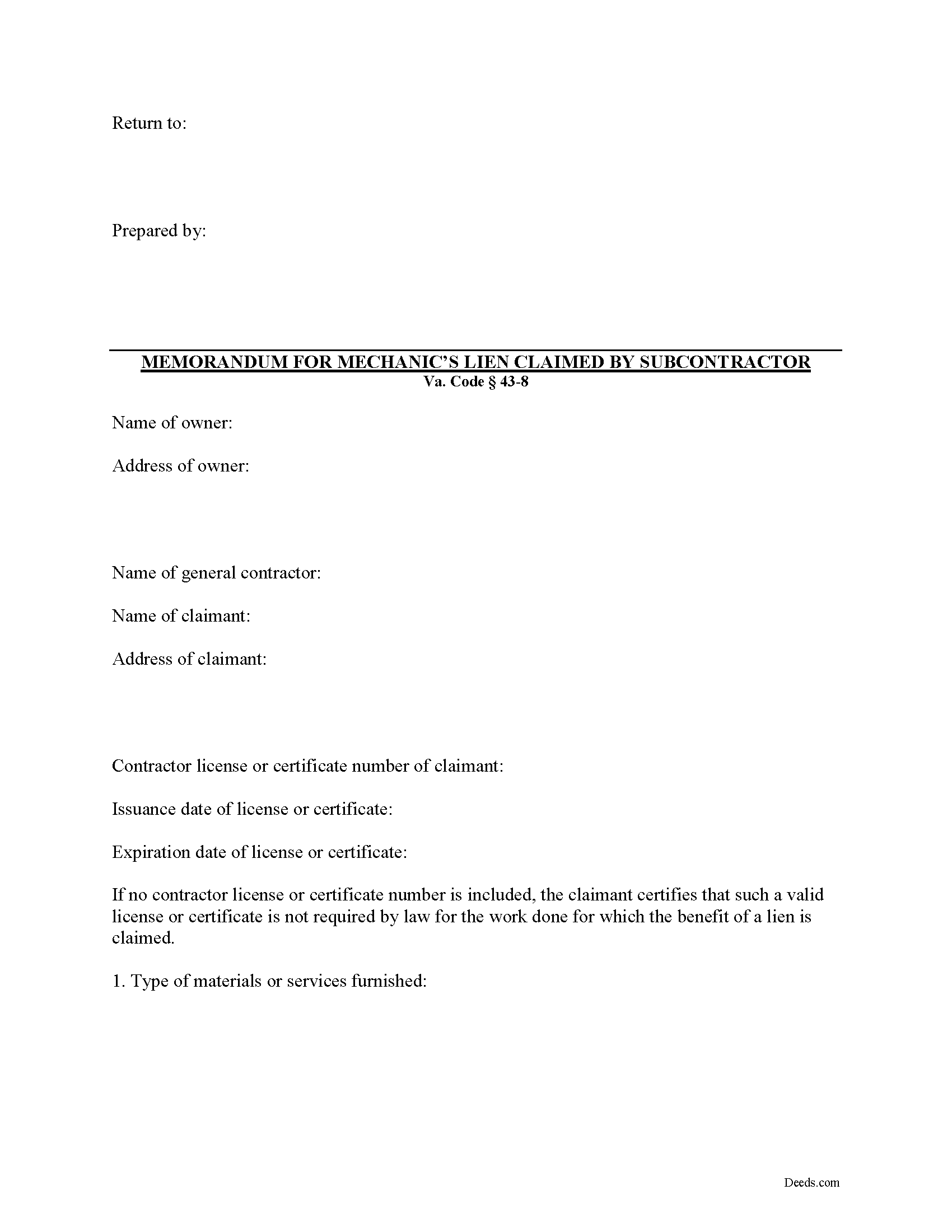
Virginia Mechanic's Lien by a Subcontractor
In Virginia, a lien claimant may make a claim for a mechanic's lien by completing and recording a "Memorandum for Mechanic's Lien" document. There are separate versions of the Memorandum depending on whether the claimant is a contractor, subcontractor, or sub-subcontractor.
In general, a mechanic's lien claim is made when a property owner or other person in the chain has not paid the contractor or others owed payment. The lien works as a security device by placing an encumbrance on the property, which in turn prompts the property's owner to pay in order to remove the lien. Liens can also be sought against payment funds, for example, by preventing a contractor from being paid by the owner until the subcontractors are paid.
A general contractor must file a memorandum of lien at any time after the work is commenced or material furnished, but not later than 90 days from the last day of the month in which he last performs labor or furnishes material, and a maximum of 90 days from the time the work ends. Va. Code 43-4. The memorandum is then filed in the clerk's office in the county or city in which the property is located. Id.
... More Information about the Virginia Subcontractor Memorandum for Mechanics Lien
Sub-subcontractor Memorandum for Mechanics Lien
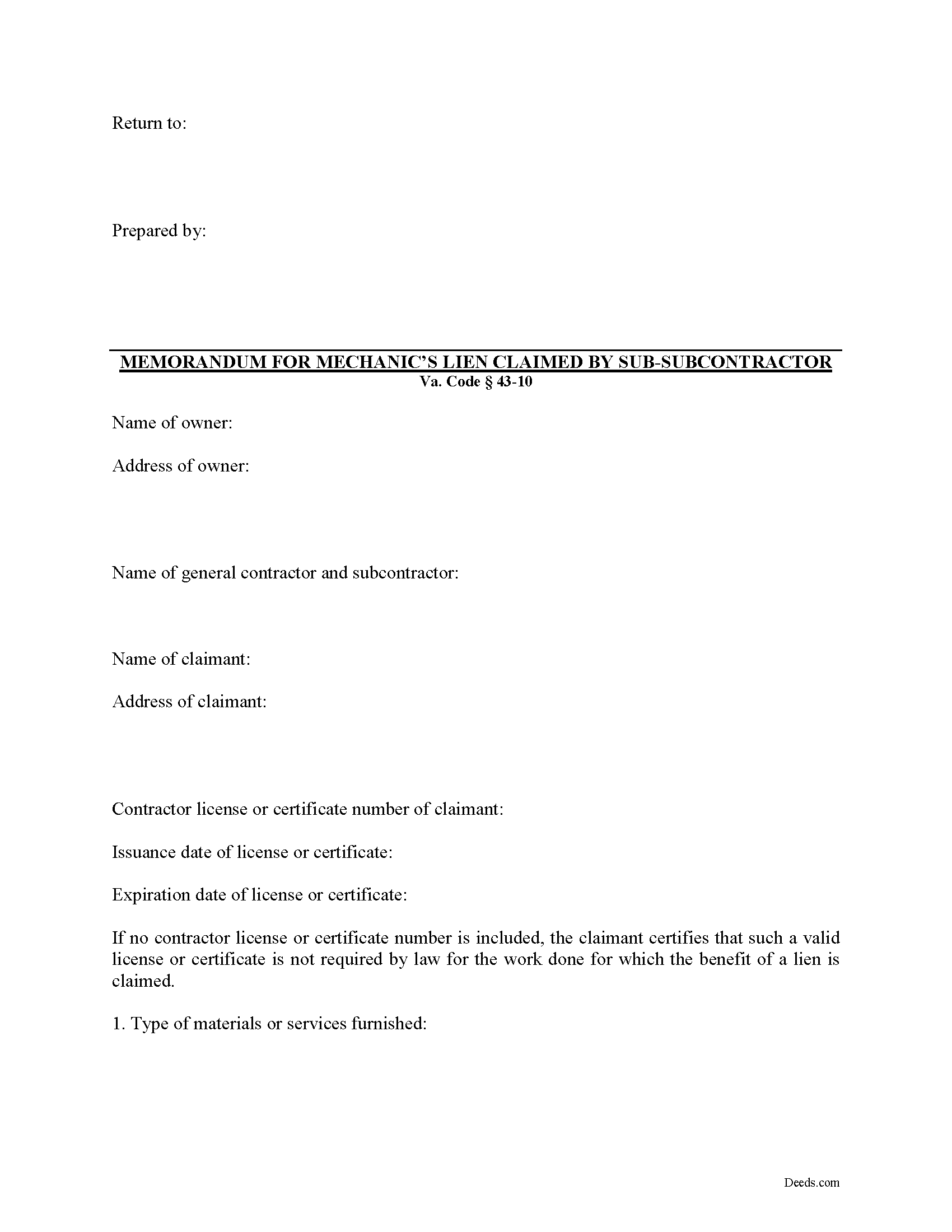
Virginia Mechanic's Lien by a Sub-subcontractor
In Virginia, a lien claimant may make a claim for a mechanic's lien by completing and recording a "Memorandum for Mechanic's Lien" document. There are separate versions of the Memorandum depending on whether the claimant is a contractor, subcontractor, or sub-subcontractor.
In general, a mechanic's lien claim is made when a property owner or other person in the chain has not paid the contractor or others owed payment. The lien works as a security device by placing an encumbrance on the property, which in turn prompts the property's owner to pay in order to remove the lien. Liens can also be sought against payment funds, for example, by preventing a contractor from being paid by the owner until the subcontractors are paid.
A general contractor must file a memorandum of lien at any time after the work is commenced or material furnished, but not later than 90 days from the last day of the month in which he last performs labor or furnishes material, and within 90 days from the time the work ends. Va. Code 43-4. The memorandum is then filed in the clerk's office in the county or city in which the property is located. Id.
Th... More Information about the Virginia Sub-subcontractor Memorandum for Mechanics Lien
Conditional Lien Waiver on Partial Payment
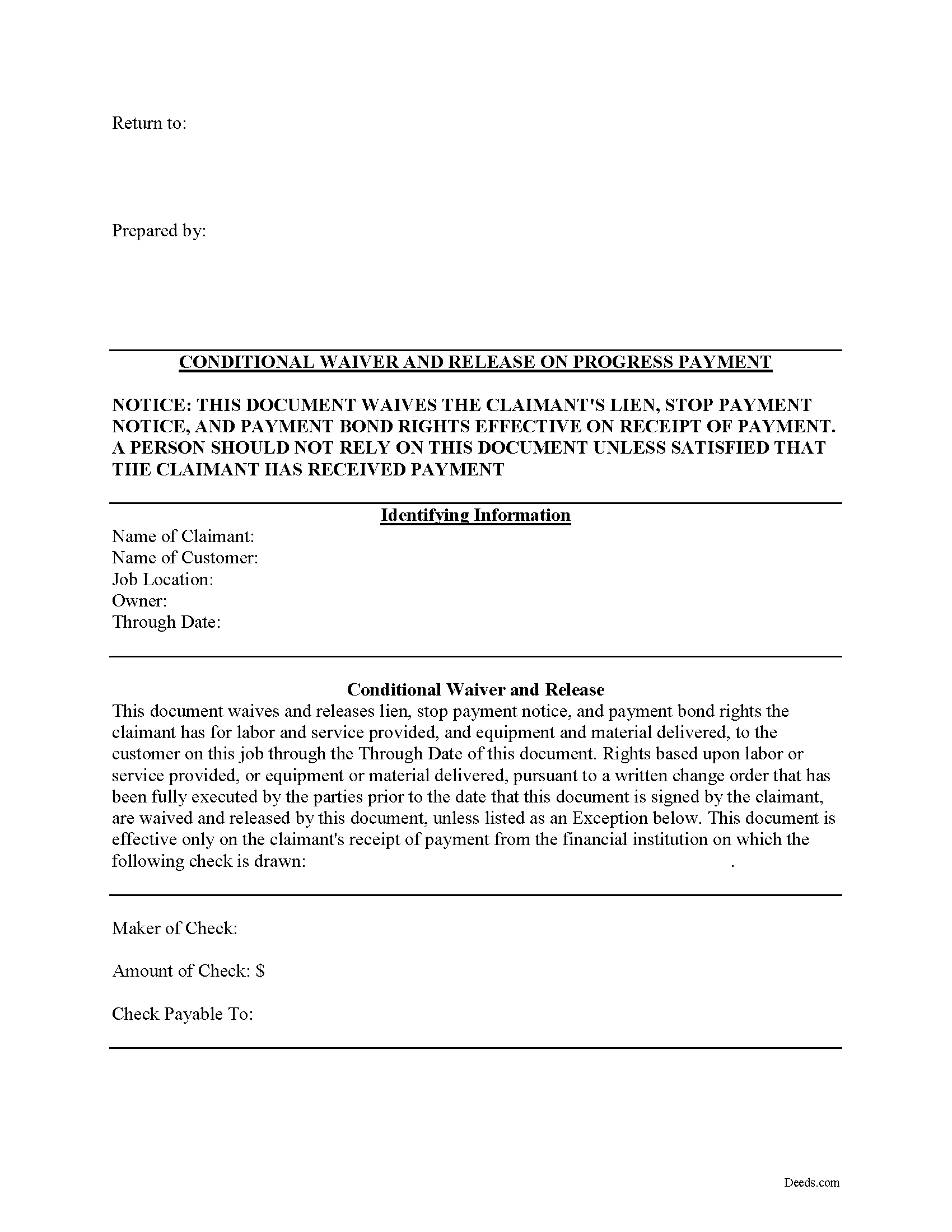
Lien waivers are quid-pro-quo arrangements between contractors and owners, intended to induce payment from an owner in return for the contractor waiving some or all available mechanic's lien rights.
In Virginia, any right to file or enforce any mechanics' lien may be waived in whole or in part at any time by any person entitled to such lien, except that a subcontractor, lower-tier subcontractor, or material supplier may not waive or diminish his lien rights in a contract in advance of furnishing any labor, services, or materials. Va. Code 43-3(C).
Waivers fall under two broad categories of "conditional" and "unconditional," and there are two subcategories of waivers for a "partial" or "final" payment. Each type comes with benefits and risks, so take care to use the correct form for the situation.
A conditional waiver depends on the actual receipt of payment, so use it when a party pays by check, but the recipient is not sure that it will clear. Therefore, if the bank returns the check unpaid, it is still possible to claim a lien down the line. This type of waiver offers greater protection to the contractor.
Use a partial payment waiver to acknowledge a payment on acc... More Information about the Virginia Conditional Lien Waiver on Partial Payment
Unconditional Lien Waiver on Partial Payment
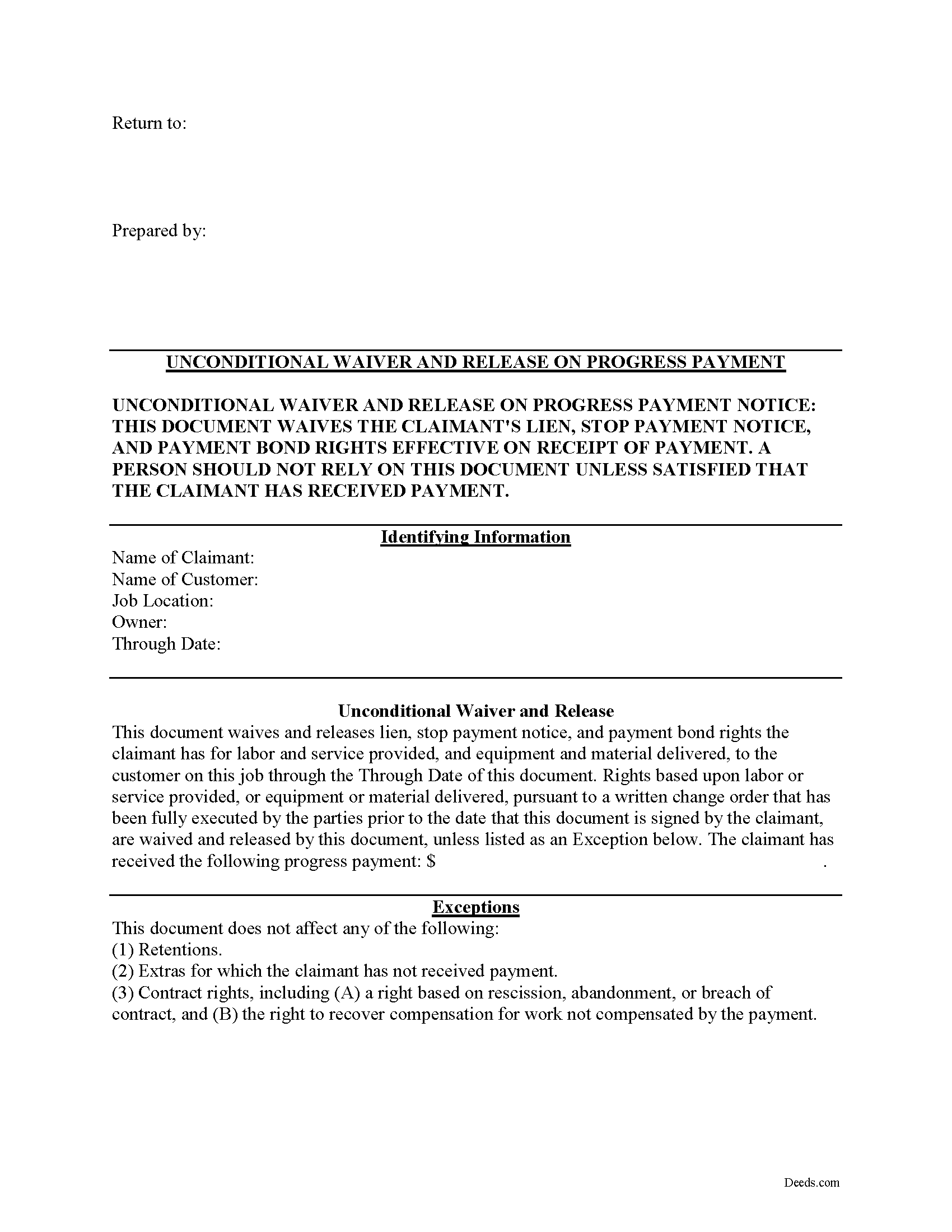
Lien waivers are used between contractors and property owners as a quid-pro-quo arrangement to induce payment from an owner, in return for the contractor waiving some or all available mechanic's lien rights. If the appropriate waivers are used, they offer advantages for both the contractor and the owner.
In Virginia, any right to file or enforce any mechanics' lien may be waived in whole or in part at any time by any person entitled to such lien, except that a subcontractor, lower-tier subcontractor, or material supplier may not waive or diminish his lien rights in a contract in advance of furnishing any labor, services, or materials. Va. Code 43-3(C). A provision that waives or diminishes a subcontractor's, lower-tier subcontractor's, or material supplier's lien rights in a contract executed prior to providing any labor, services, or materials is null and void. Id.
The Virginia legislature does not mandate a required form of a lien waiver, so common law principles of contract allow for the parties to use any form that clearly spells out their intentions. Note that it is a felony for any person to knowingly present a waiver form to an owner, his agent, contractor, lender, or... More Information about the Virginia Unconditional Lien Waiver on Partial Payment
Conditional Lien Waiver on Final Payment
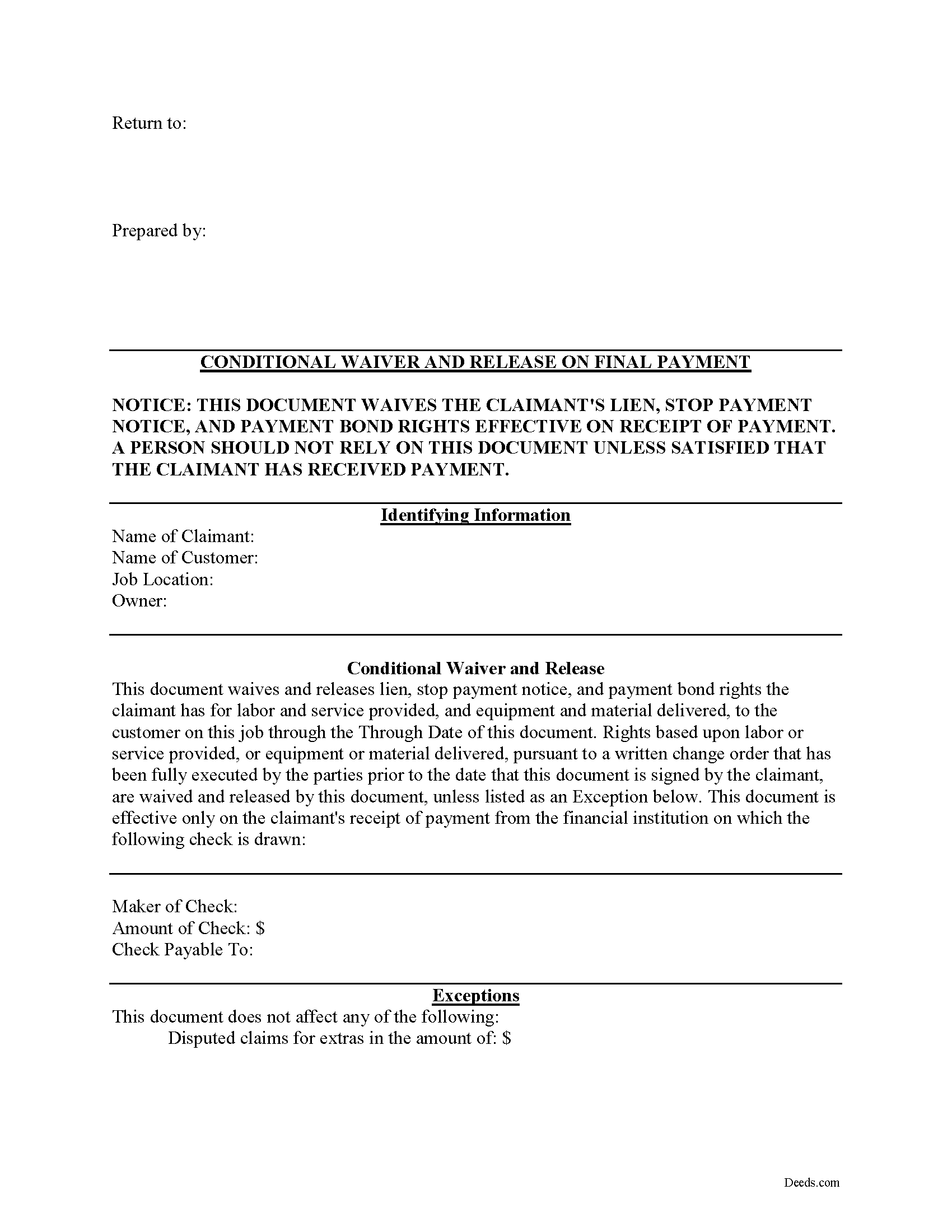
Lien waivers are quid-pro-quo arrangements between contractors and owners. The purpose of such waivers is to induce payment from an owner in return for the contractor waiving some or all available mechanic's lien rights. If the correct waivers are used, they offer advantages for both a contractor and owner.
In Virginia, any right to file or enforce any mechanics' lien may be waived in whole or in part at any time by any person entitled to such lien, except that a subcontractor, lower-tier subcontractor, or material supplier may not waive or diminish his lien rights in a contract in advance of furnishing any labor, services, or materials. Va. Code 43-3(C). A provision that waives or diminishes a subcontractor's, lower-tier subcontractor's, or material supplier's lien rights in a contract executed prior to providing any labor, services, or materials is null and void. Id.
The Virginia legislature does not mandate a required form of a lien waiver, so common law principles of contract allow for the parties to use any form that clearly spells out their intentions. Note that it is a felony for any person to knowingly present a waiver form to an owner, his agent, contractor, lender,... More Information about the Virginia Conditional Lien Waiver on Final Payment
Unconditional Lien Waiver on Final Payment
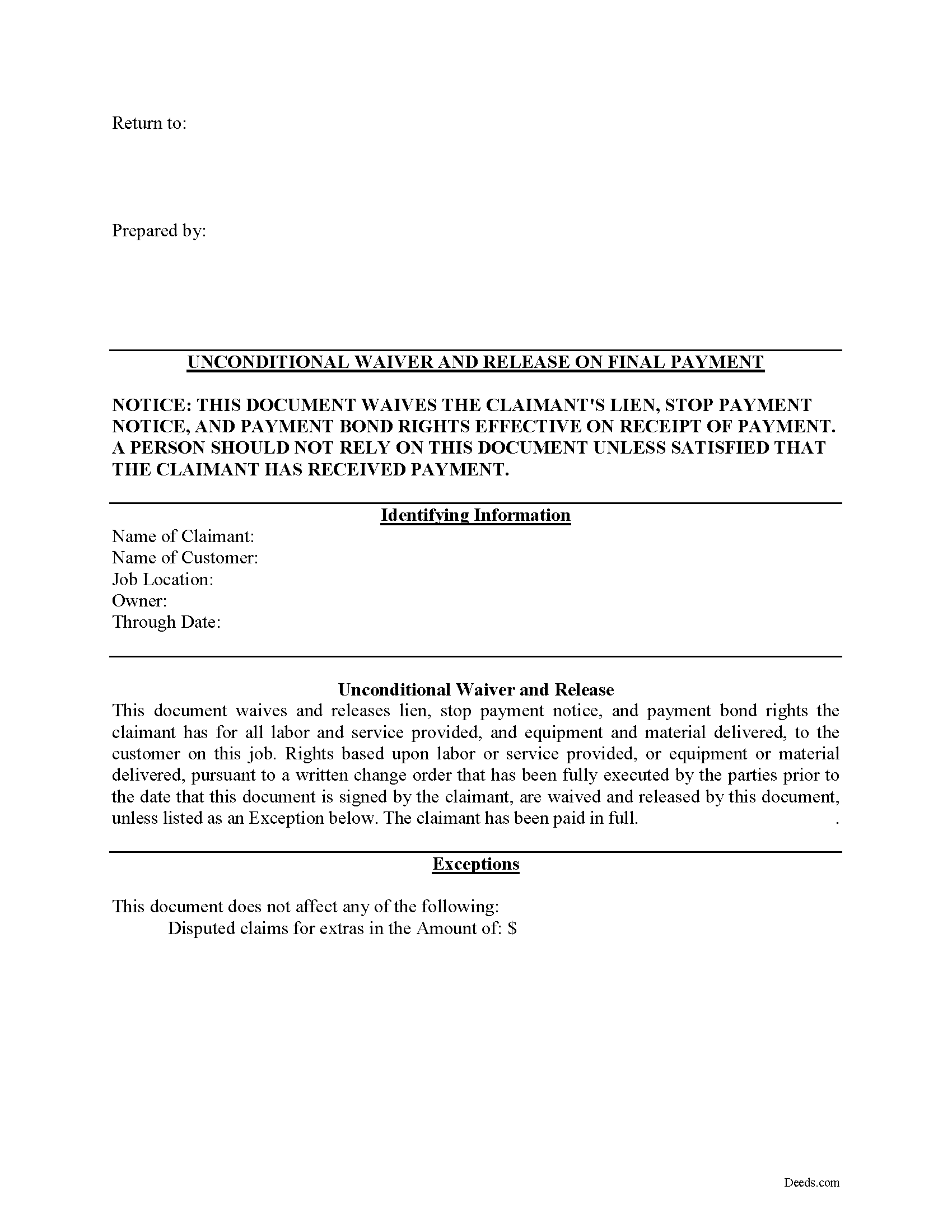
Lien waivers are used between contractors and property owners as a quid-pro-quo arrangement to induce payment from an owner in return for the contractor waiving some or all available mechanic's lien rights. If the appropriate waivers are used, they offer advantages for both the contractor and the owner.
In Virginia, any right to file or enforce any mechanics' lien may be waived in whole or in part at any time by any person entitled to such lien, except that a subcontractor, lower-tier subcontractor, or material supplier may not waive or diminish his lien rights in a contract in advance of furnishing any labor, services, or materials. Va. Code 43-3(C). A provision that waives or diminishes a subcontractor's, lower-tier subcontractor's, or material supplier's lien rights in a contract executed prior to providing any labor, services, or materials is null and void. Id.
The Virginia legislature does not mandate a required form of a lien waiver, so common law principles of contract allow for the parties to use any form that clearly spells out their intentions. Note that it is a felony for any person to knowingly present a waiver form to an owner, his agent, contractor, lender, or ... More Information about the Virginia Unconditional Lien Waiver on Final Payment
Disclaimer of Interest
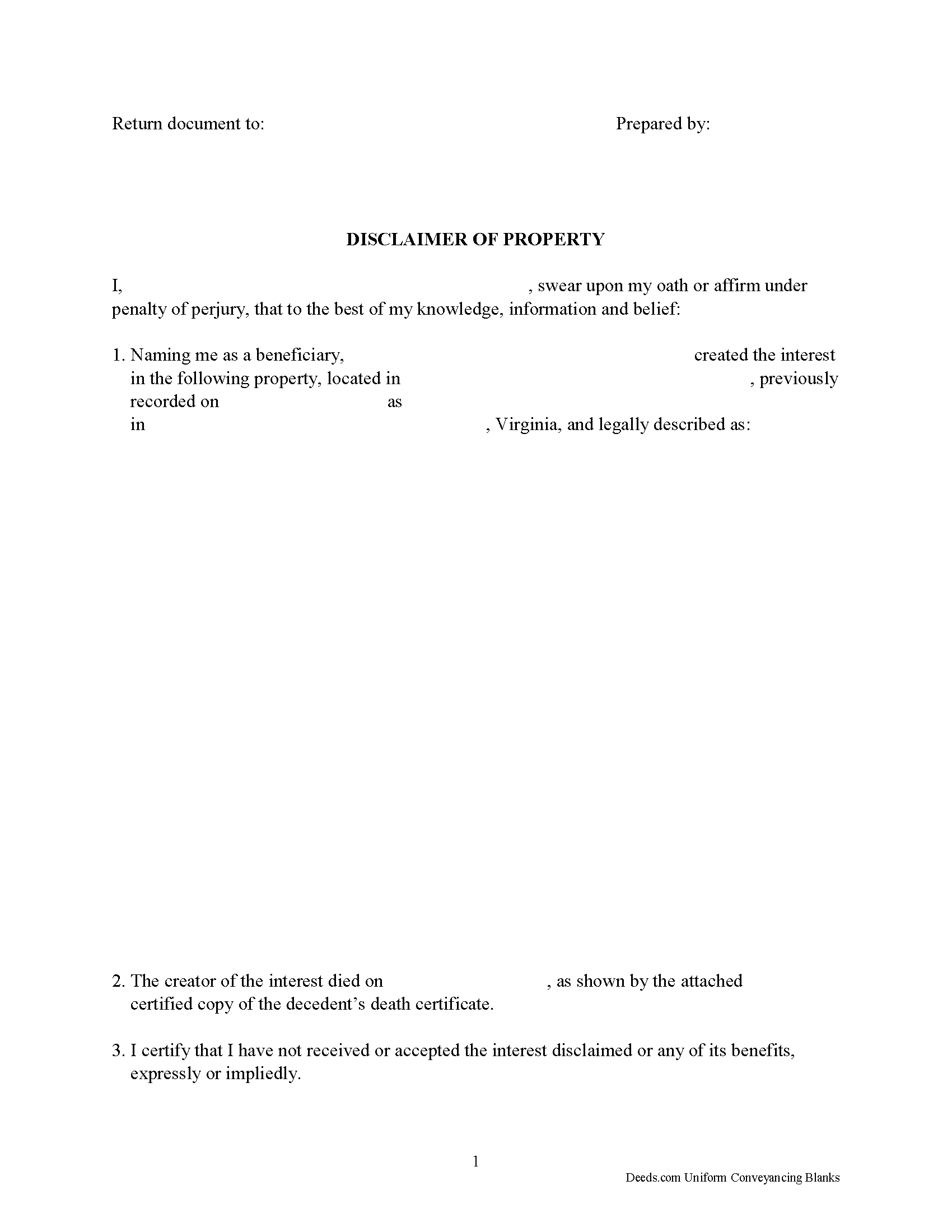
A beneficiary of an interest in property (real estate) in Virginia can renounce all or part of a bequeathed interest in, or power over, that property under Va. Code 64.2-2603(a), as long as it has not been accepted through actions that indicate ownership or transferred in any way (Va. Code 64.2-2611(b)). The written disclaimer must identify the creator of the interest, provide a description of the disclaimed interest, a declaration of the disclaimer and its extent, and it needs to be signed by the disclaiming party (Va. Code 64.2-2603(d)).
Deliver the disclaimer within nine months of the transfer (e.g., the death of the creator of the interest) to the personal representative of the decedent's estate or the court having jurisdiction to appoint such a person (Va. Code 64.2-2610(c)); other scenarios are outlined in the remaining sections of Va. Code 64.2-2610. In the case of real property, record the disclaimer with the clerk of the circuit court in the city or county where the property is located (Va. Code 64.2-26).
A disclaimer is irrevocable and binding for the disclaiming party and those claiming under him or her (Va. Code 64.2-2603(f)), so be sure to consult an attorney w... More Information about the Virginia Disclaimer of Interest
Memorandum of Lis Pendens
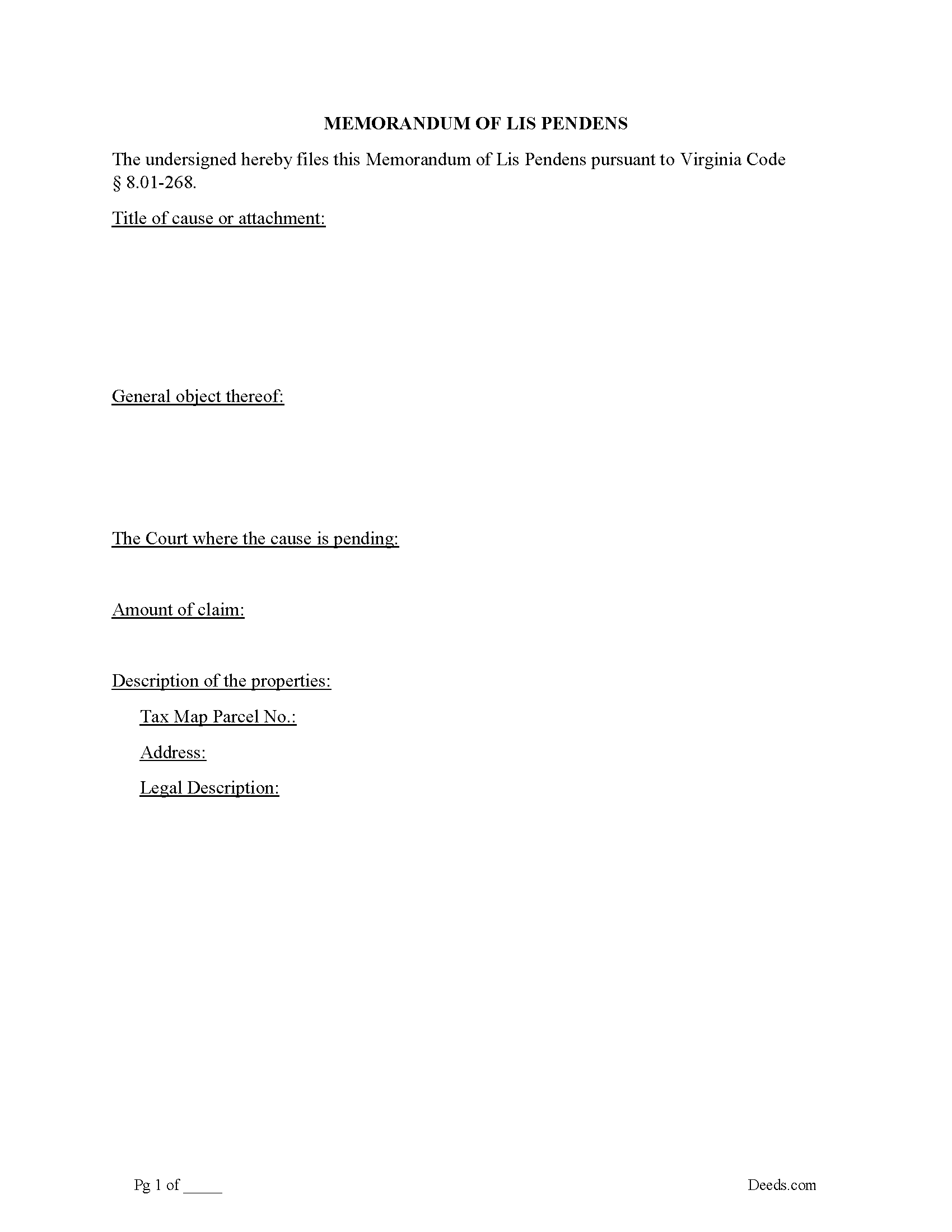
To provide constructive notice of a pending lawsuit a Memorandum of Lis Pendens is filed when the claim brought forth (seeks to establish an interest by the filing party in the real property described in the memorandum.) Generally speaking a Memorandum becomes effective when recorded in the County or City, Circuit Court where the property is located. (8.01-268. (B))
The Memorandum of Lis Pendens shall contain:
(the title of the cause or attachment
the general object thereof
the court wherein it is pending
the amount of the claim asserted by the plaintiff ... More Information about the Virginia Memorandum of Lis Pendens